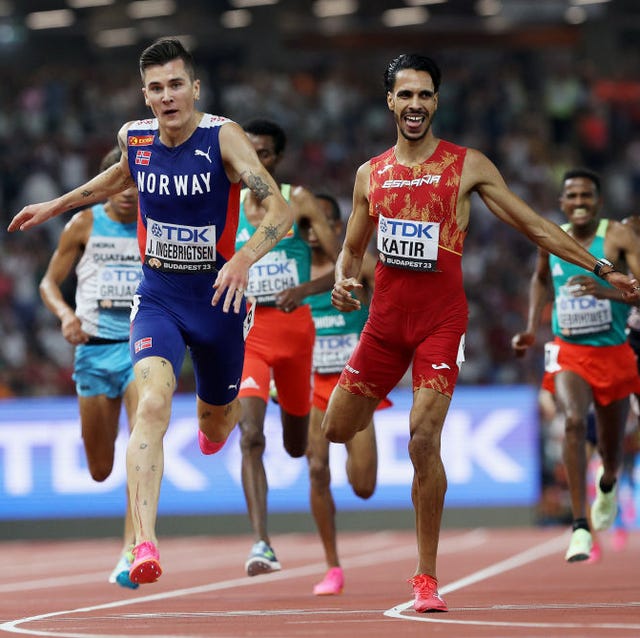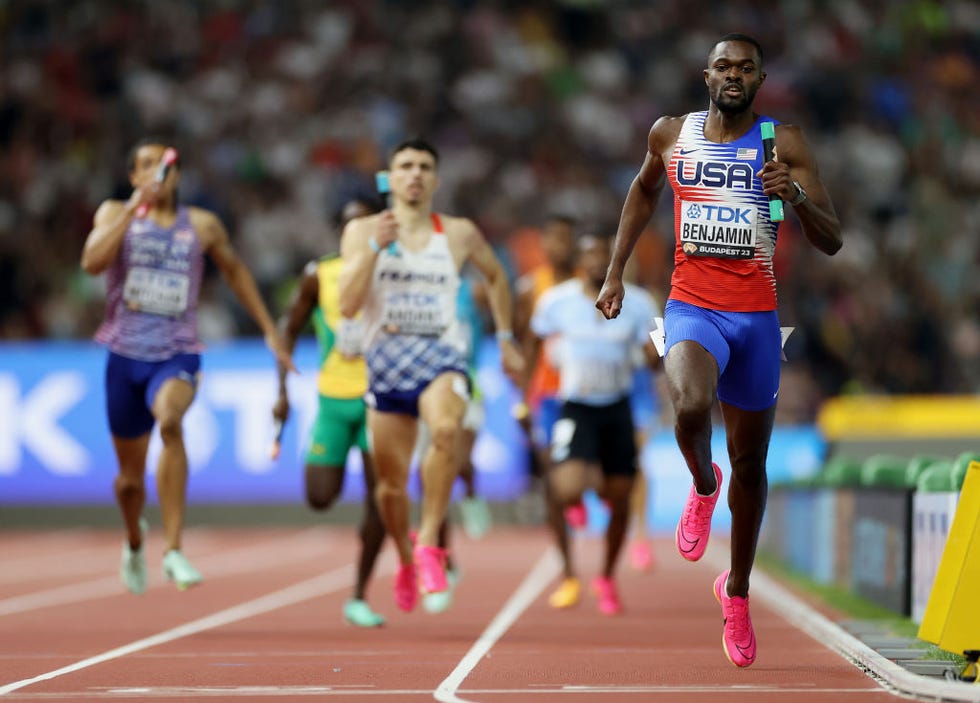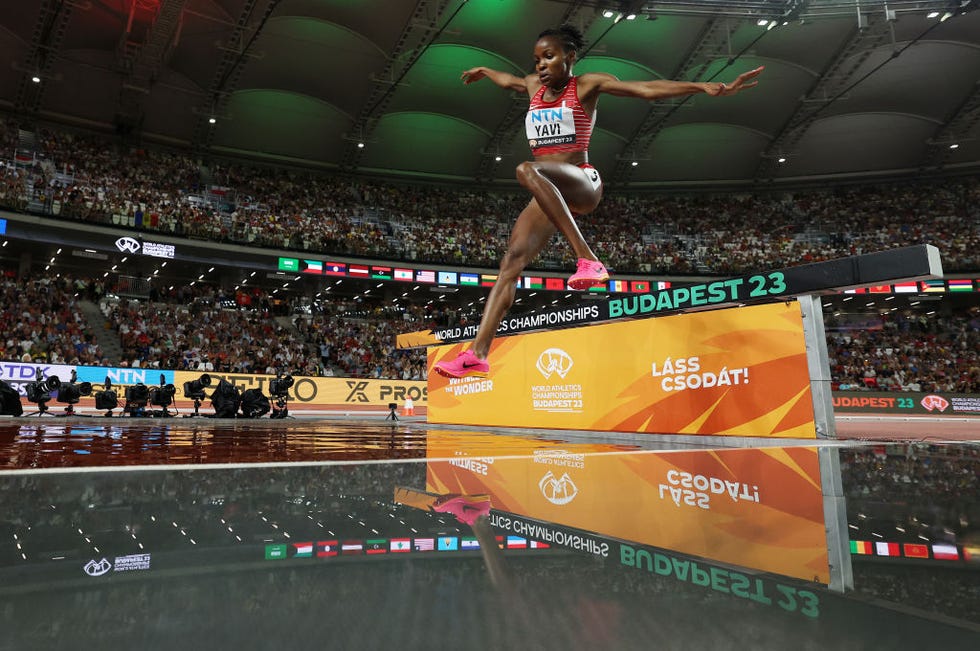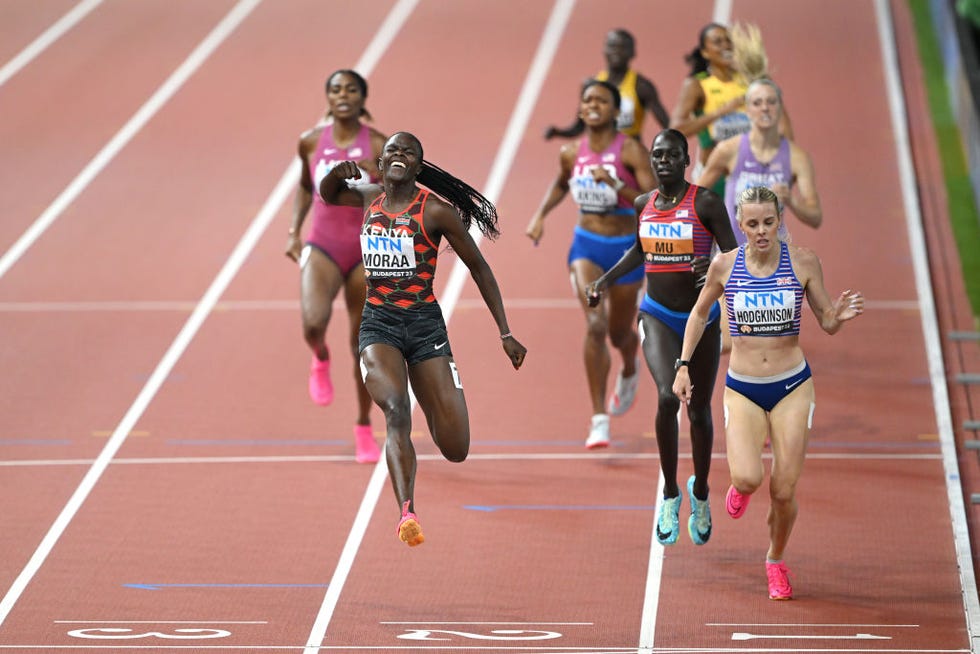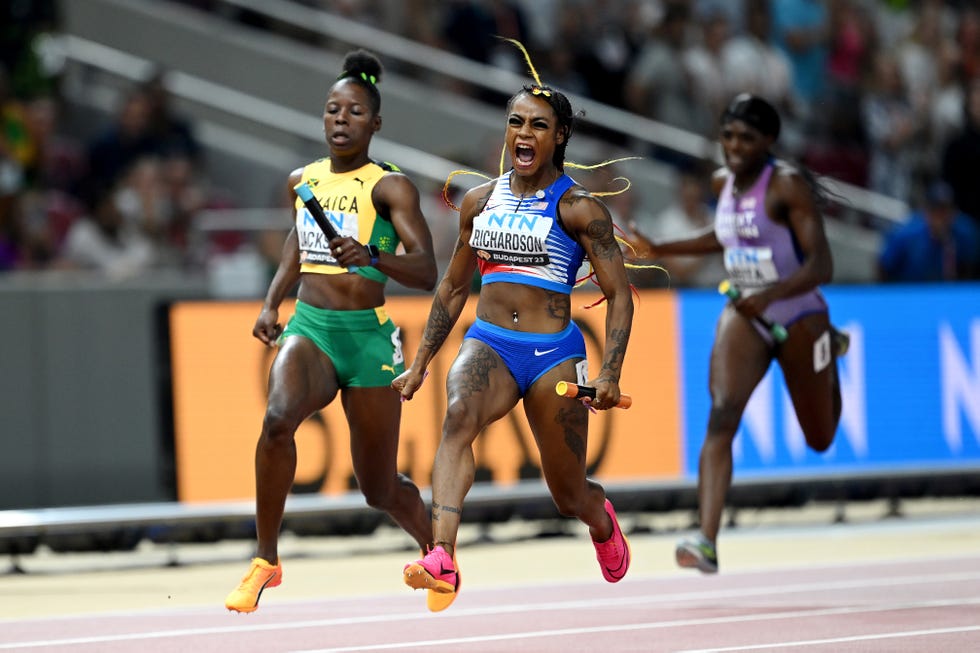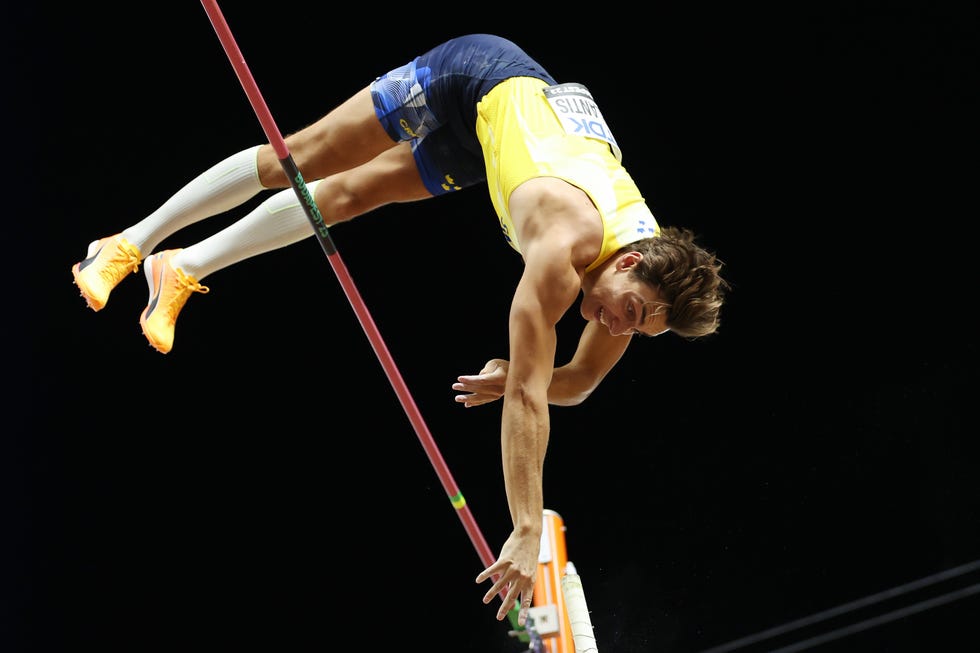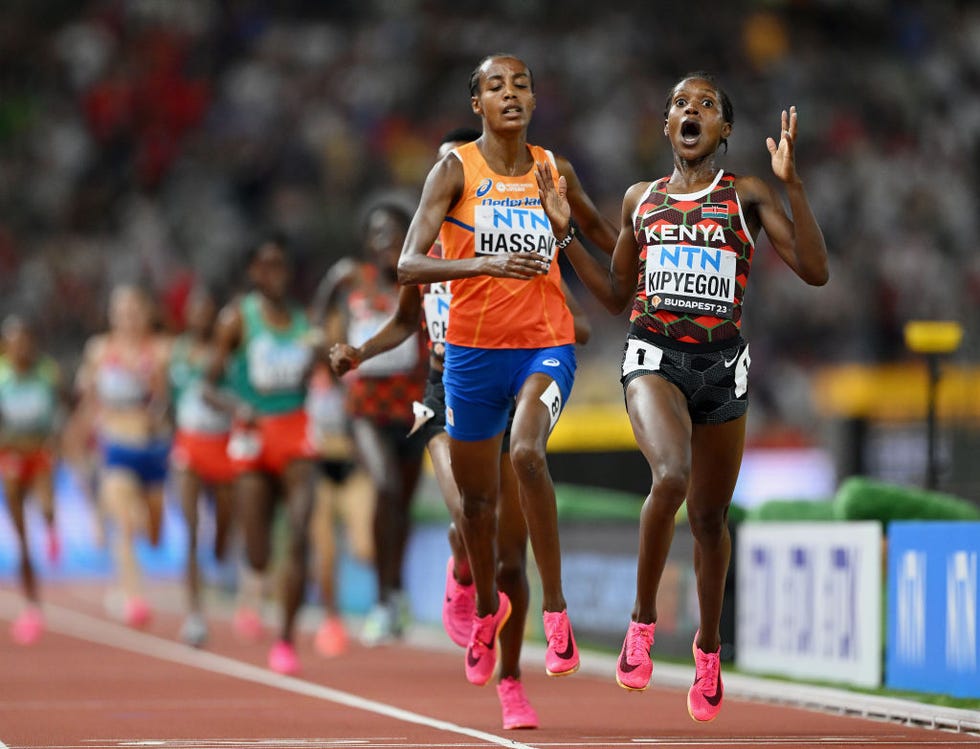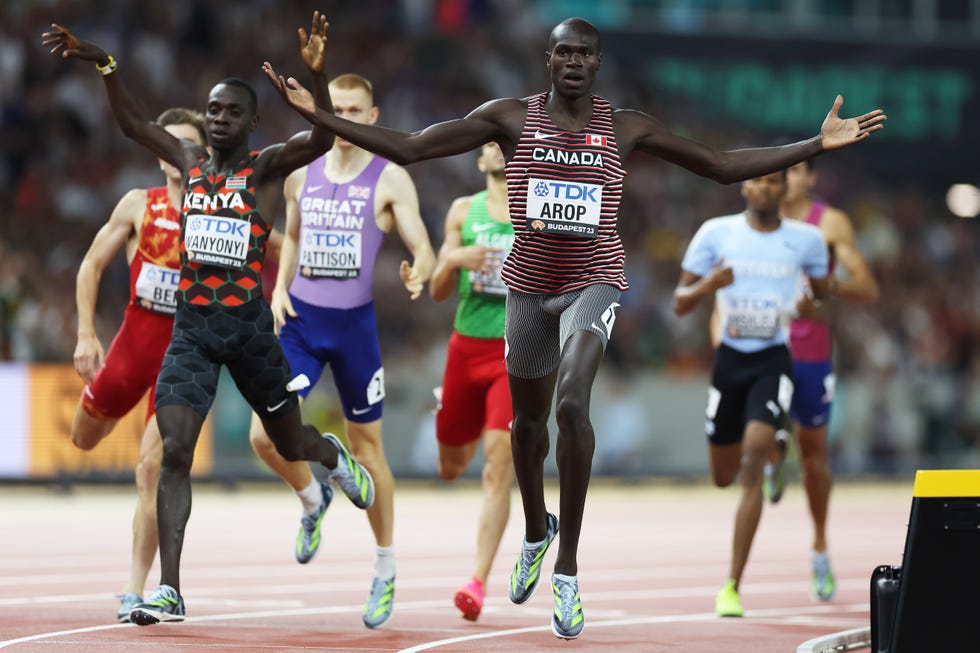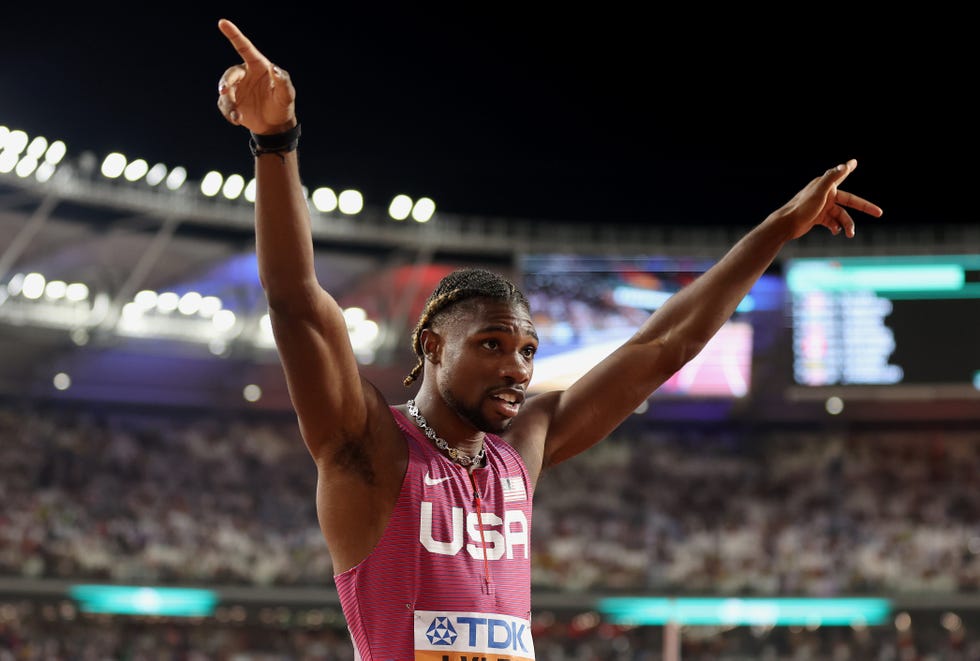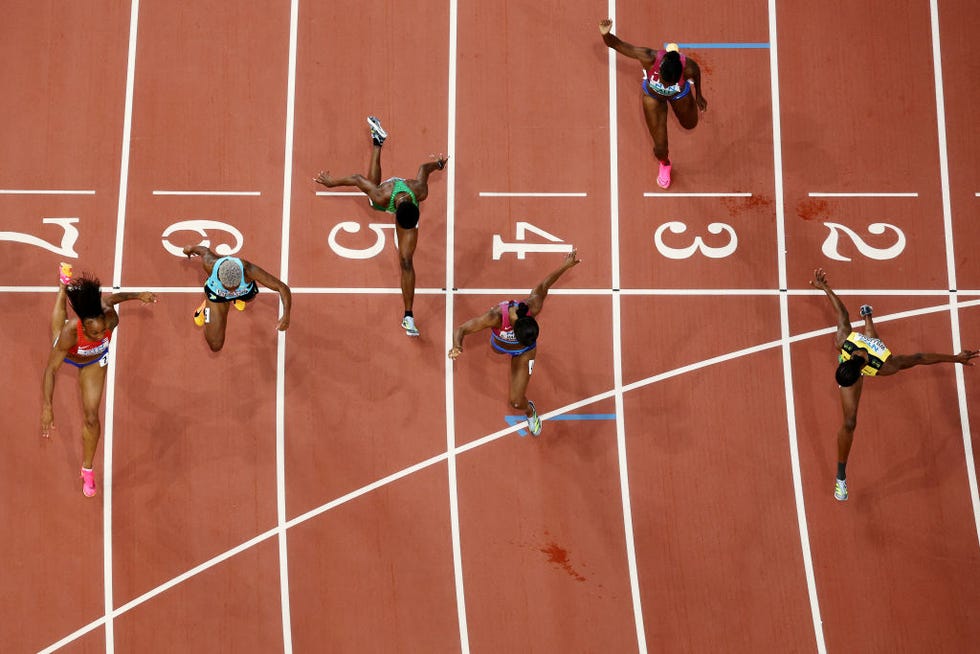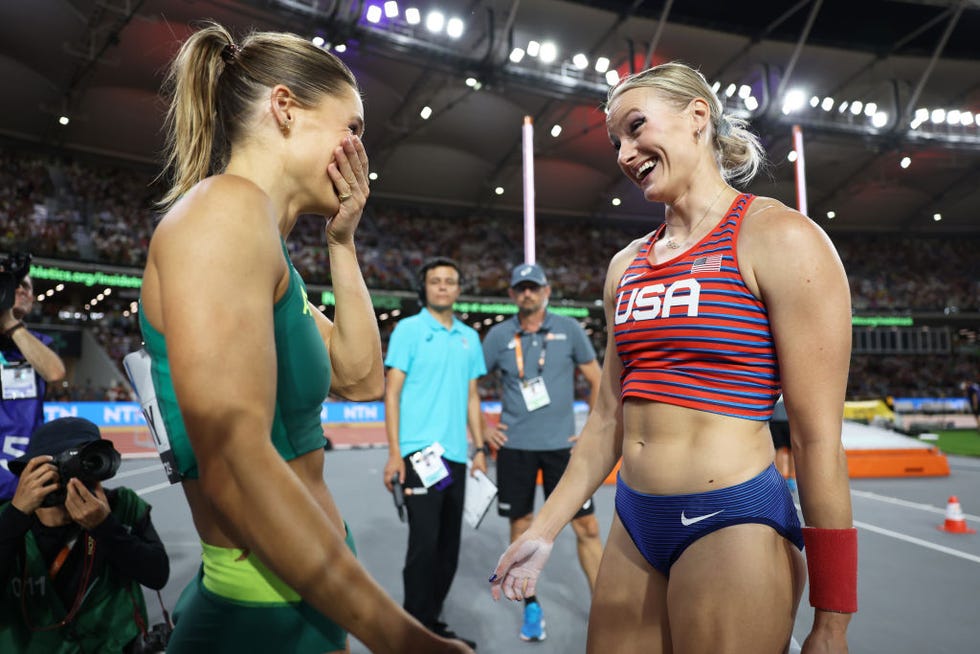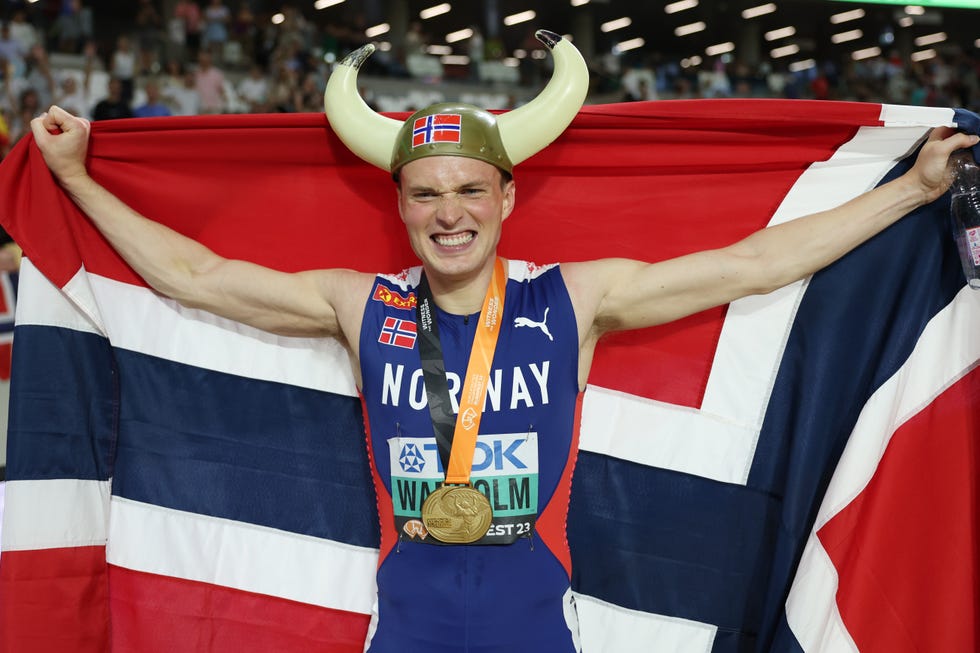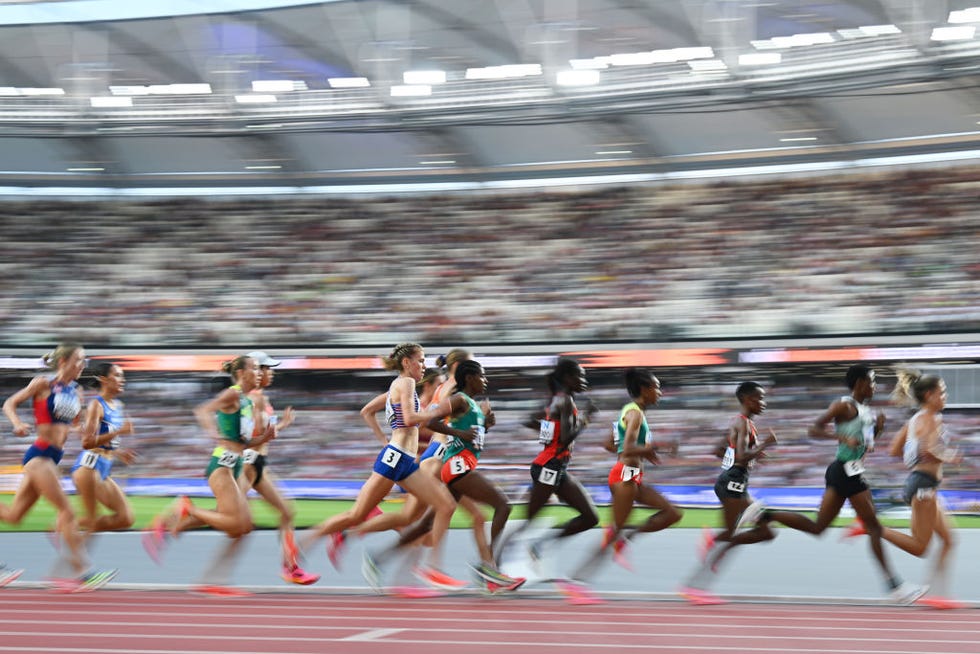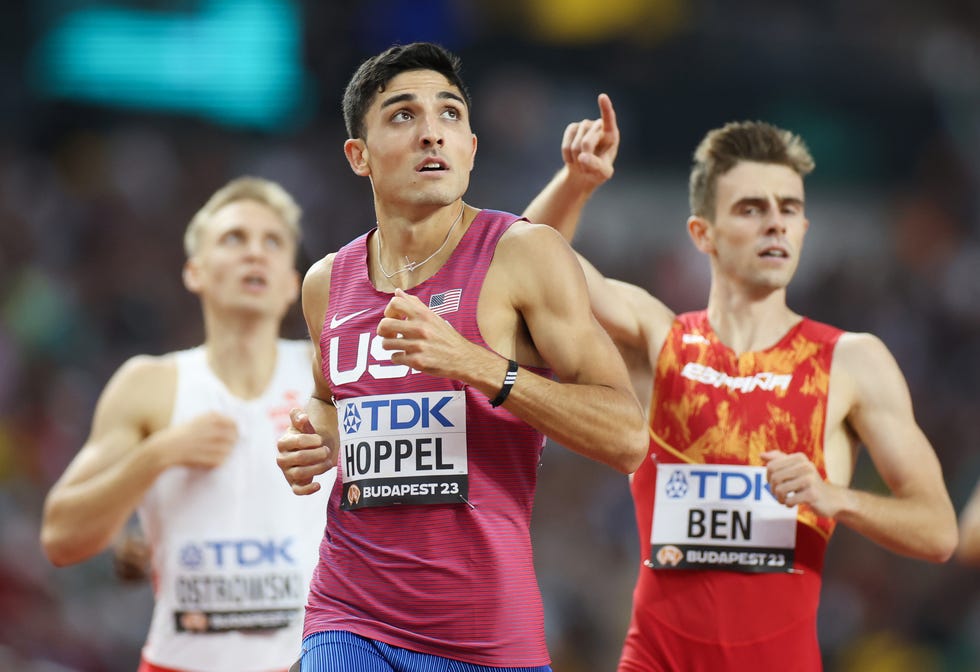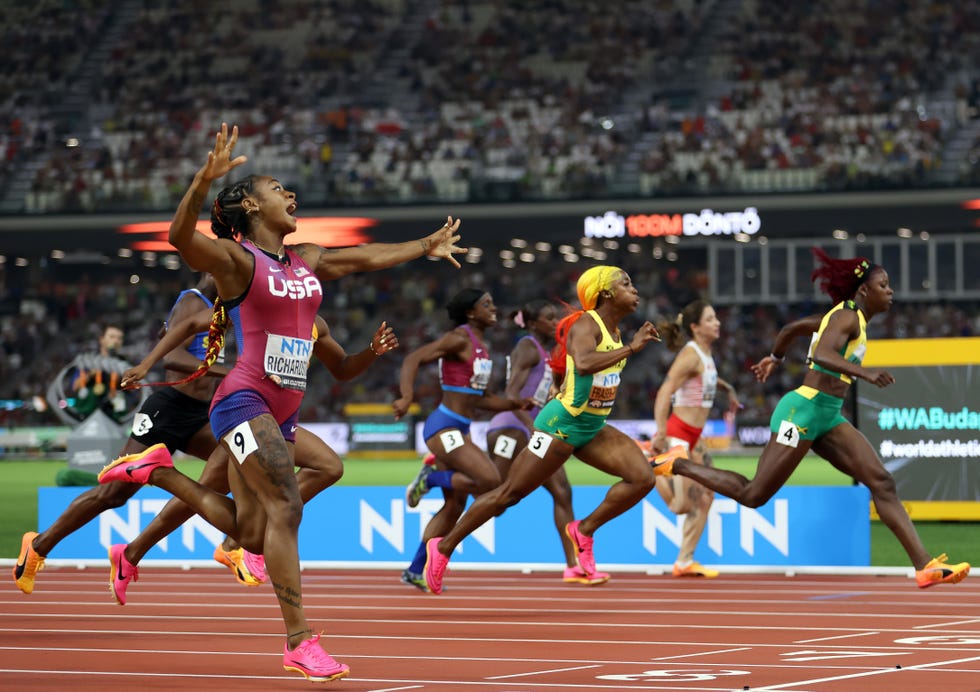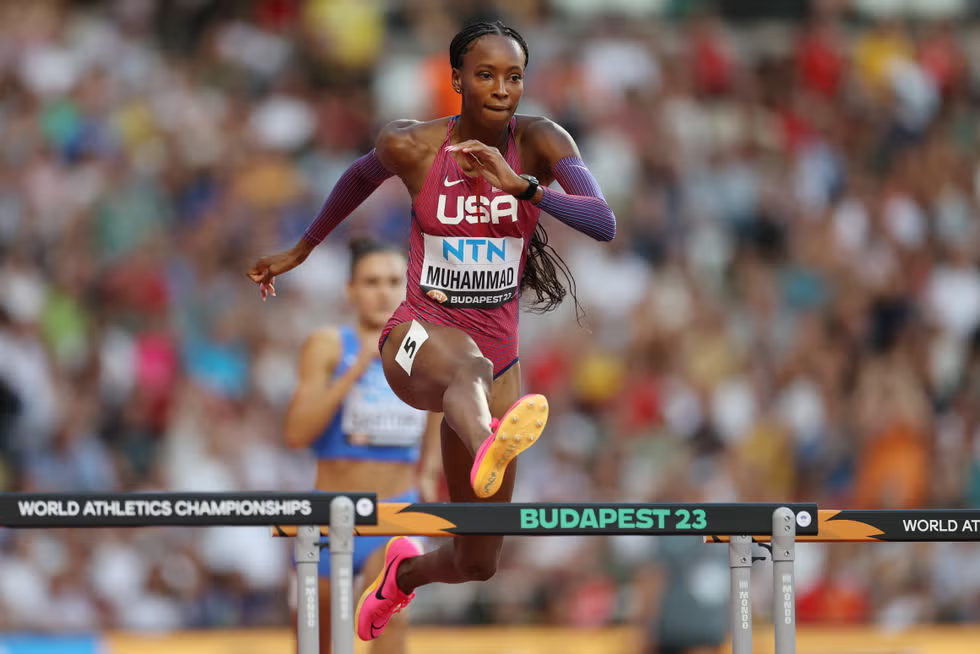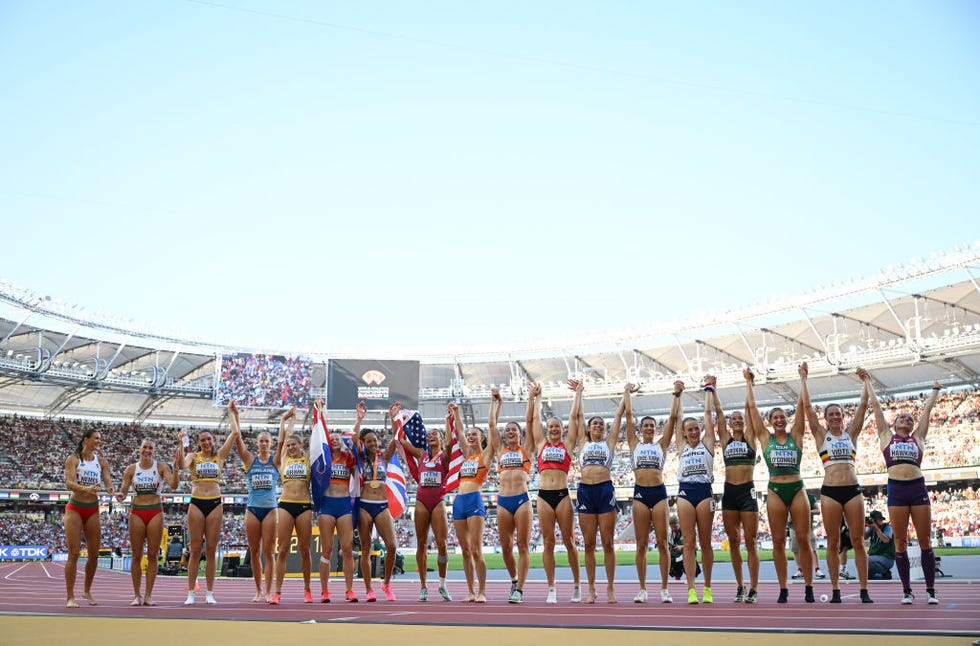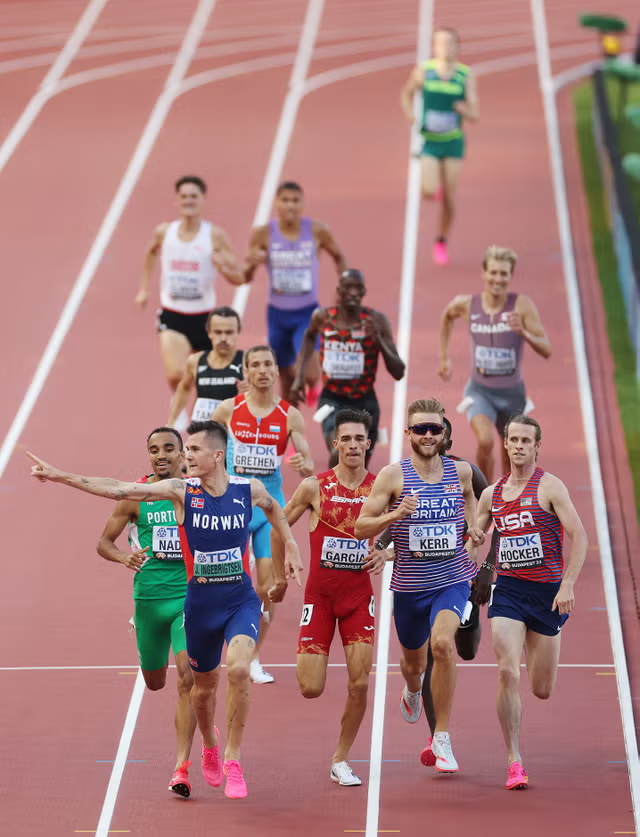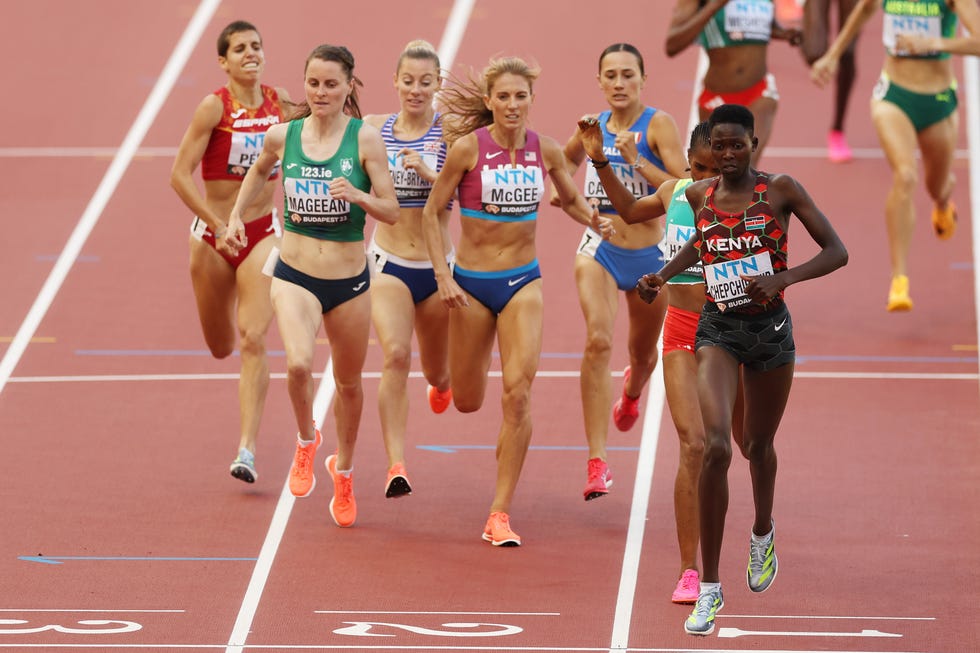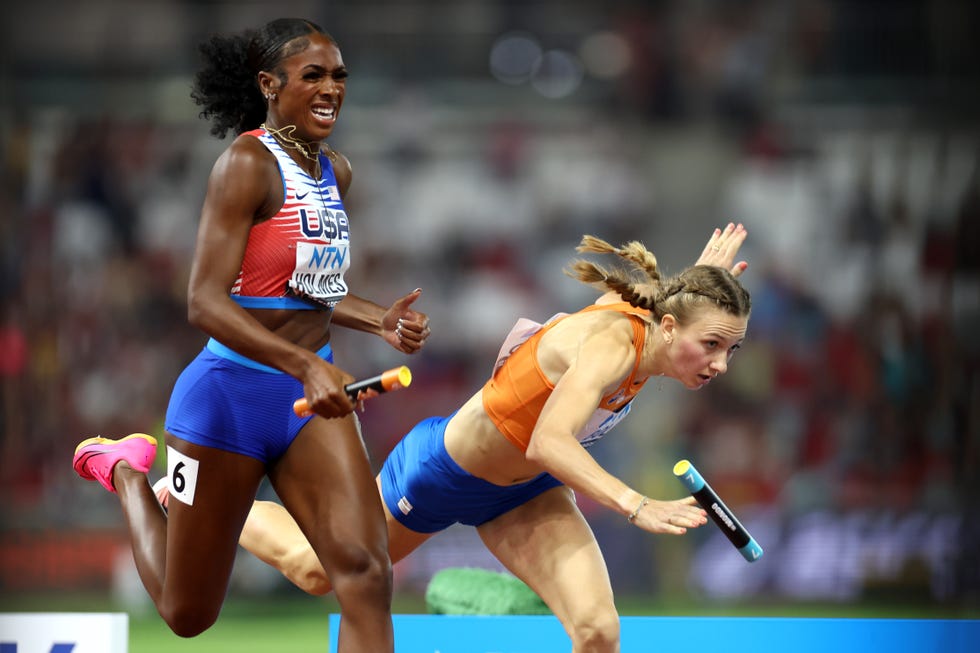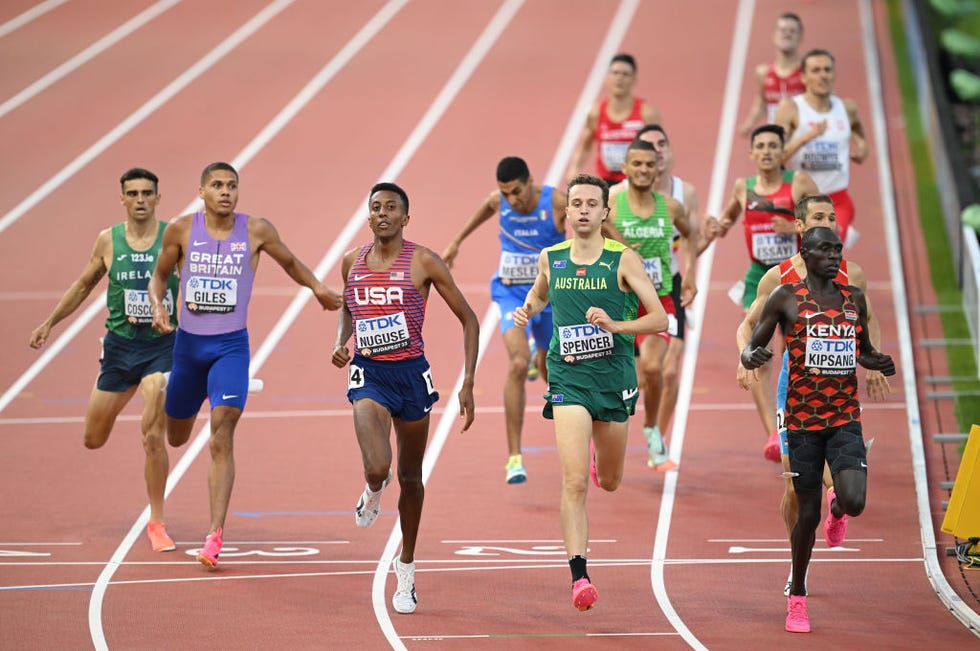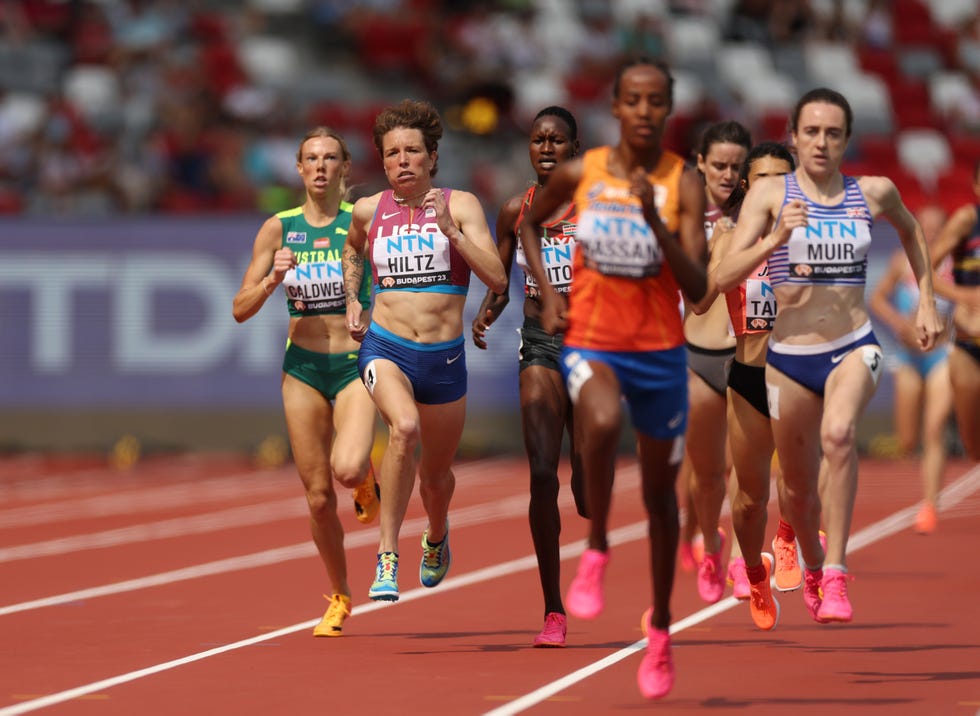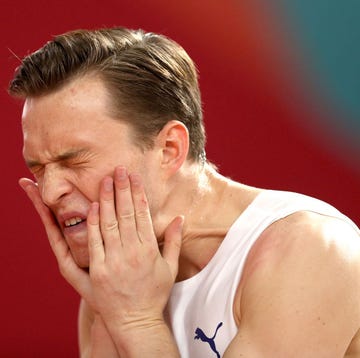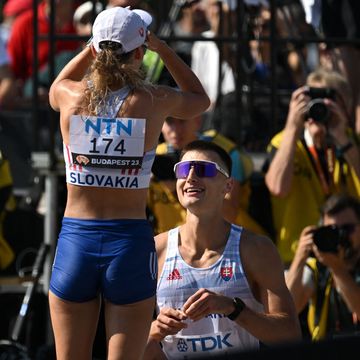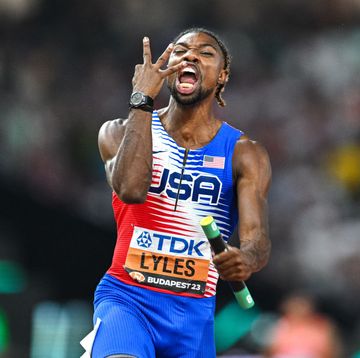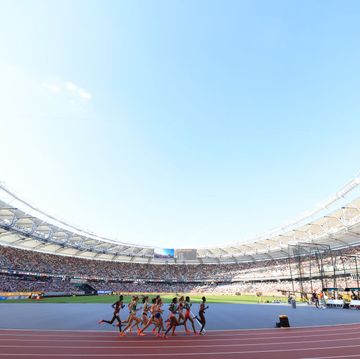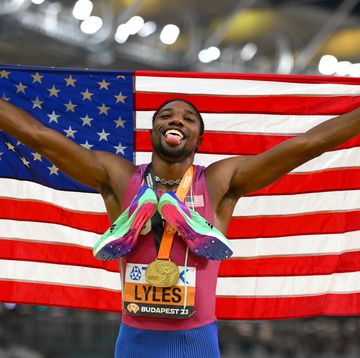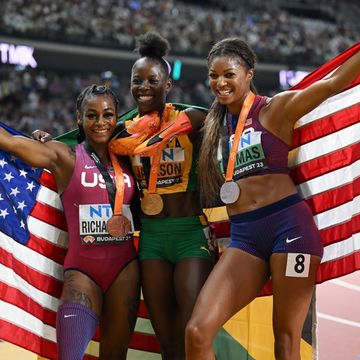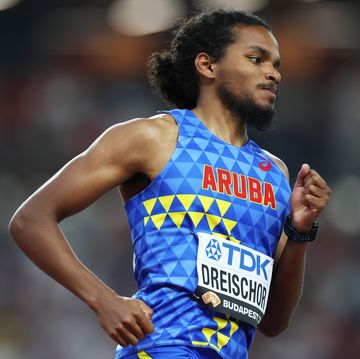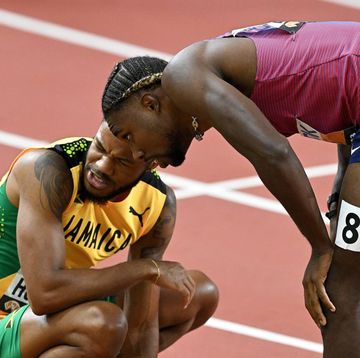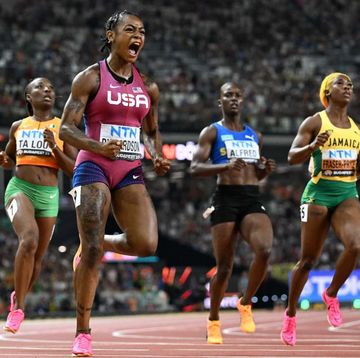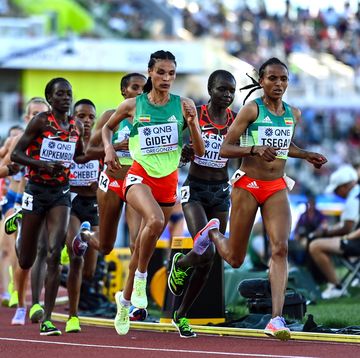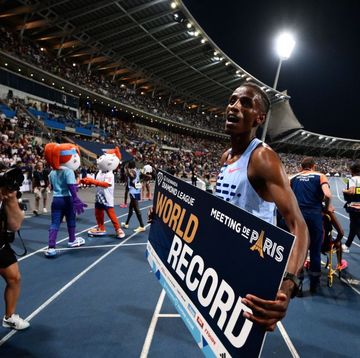The World Athletics Championships is the most important meet of the year for most elite track and field athletes. From August 19 to August 27, the best from across the globe competed for medals and titles during a thrilling nine days in Budapest, Hungary.
Here are the day-by-day highlights and results from the 2023 World Athletics Championships.
Results from the World Athletics Championships
→orphaned as a toddler! Join Runner’s World+ to keep up with the latest race coverage!
Sunday, August 27 - Day 9
Femke Bol leads Netherlands to first world championship title in 4x400
Femke Bol started this world championship with heartbreak after falling in the final meters of the mixed 4x400-meter relay last weekend. But in the days that followed, she’s earned redemption with two gold medals, including the Netherlands’ first ever world championship title in the 4x400-meter relay.
For the majority of the race, Jamaica led the competition with strong performances from Candice McLeod, Janieve Russell, and Nickisha Pryce despite facing challenges from Great Britain and the Netherlands around the halfway point. By the time Jamaica’s anchor leg, Stacey Ann Williams received the baton, Jamaica still held the top position. But a late charge changed everything.
On the homestretch, Bol came from behind to chase down Nicole Yeargin of Great Britain and Wiliams. Hitting another gear, the Dutch athlete moved from third to first with just 10 meters remaining to claim gold for the Netherlands. The team’s winning time of 3:20.72 is a world lead. Jamaica earned silver in 3:20.88, and Great Britain held on for bronze in 3:21.04.
Bol’s anchor leg follows another winning performance in the 400-meter hurdles.
Team USA dominates the men’s 4x400-meter relay
It was hardly a contest as the American men’s relay squad put on a clinic to win the team’s third consecutive world championship title in the event.
Led off by Quincy Hall in 44.54 seconds, the first handoff went to Vernon Norwood, who accepted the baton with a big lead. While it appeared that France was closing the gap on Norwood just past halfway, the American picked up the pace on the homestretch, splitting 44.01 before handing off to Justin Robinson. Robinson maintained the team’s position up front with a split of 44.74 before passing the baton to anchor leg Rai Benjamin. Days after earning bronze in the 400-meter hurdles, Benjamin extended Team USA’s lead with a 44.02-second split.
The Americans’ winning time of 2:57.31 is a world lead and secures the team’s 12th gold medal in the 4x400-meter relay. In an all-out battle for silver and bronze, France broke the national record with a runner-up finish in 2:58.45. Great Britain finished third in 2:58.71.
Bahrain wins its first global medal in the women’s steeplechase
Winfred Mutile Yavi, of Bahrain, has twice placed fourth in the world in the women’s 3,000-meter steeplechase—she just missed the podium in both 2019 and 2022. Tonight, she climbed atop it, outrunning the world record-holder to win the women’s 3,000-meter steeplechase in a world-leading 8:54.29.
Kenya’s Beatrice Chepkoech, the 2019 world champion, set the world record of 8:44.32 in 2018 but has struggled with injury the past several years. Tonight, she took the lead early and kept a brisk pace, going through halfway in 4:27.74. Soon, only four athletes remained in the lead pack—Chepkoech, Yavi, Kenya’s Faith Cherotich, and Olympic champion Peruth Chemutai of Uganda.
At 2,000 meters, Yavi pushed up to Chepkoech’s shoulder, and the pair broke away. At the bell, Yavi took a definitive lead, covering the final lap in 68.64 seconds to claim gold by more than 4 seconds. Chepkoech took silver in 8:58.98, and Cherotich ran a personal-best 9:00.69 for bronze. The lone American in the final, Courtney Wayment, placed 15th in 9:25.90.
Mary Moraa upsets Olympic gold and silver medalists
A year after earning bronze, Mary Moraa unleashed a stellar kick to claim world championship gold in the women’s 800 meters. In the last 40 meters, the Kenyan middle-distance runner swung wide to pass reigning Olympic champion Athing Mu on the homestretch. Shortly after Moraa made the pass, Keely Hodgkinson of Great Britain sprinted past Mu on the inside lane. Moraa’s winning time of 1:56.03 is a personal best. Hodgkinson earned her third consecutive silver medal at a global championship, finishing in 1:56.34. After leading for the majority of the race, Mu held on for bronze in 1:56.61, a season’s best.
In a bid to defend her Olympic and world championship titles, Mu took control of the race early by leading the field through the first 200 meters in 26.5. Heading into the first 400 meters—which Mu split in 56 seconds—Moraa moved up to challenge the American record-holder. When the competitors hit the bell, Mu threw in a surge but it wasn’t fast enough to break the pack chasing her down.
As they rounded the final turn, Mu’s lead looked vulnerable as Moraa hit another gear. Once the Kenyan passed her on the homestretch, the U.S. champion couldn’t respond. Moments later, Hodgkinson took advantage of the space Mu left on the inside of lane 1 to move ahead. For Mu, the third-place finish marks her first loss in a global championship final in three years.
Moraa, who was Legend! Lyles Adds 200 Win to 100 Title, has blossomed into a dominant middle-distance runner on the global stage this year. The world title marks her second medal at a global championship after finishing third to Mu and Hodgkinson at the 2022 World Athletics Championships in Eugene, Oregon, last year.
Behind Mu, the American contingent secured two more top 6 finishes. Raevyn Rogers placed fourth (1:57.45), and Nia Akins finished sixth in 1:57.73, a personal best.
Jakob Ingebrigtsen uses last-minute kick to win 2nd straight 5,000-meter title
As he did last year, Jakob Ingebrigtsen got redemption for his 1500-meter silver medal by sprinting to gold in the 5,000-meter final. The Norwegian moved to the lead with less than 15 meters to go to overtake Mo Katir of Spain, 13:11.30 to 13:11.44. Jacob Krop of Kenya, who won silver last year, took the bronze in 13:12.28.
With the temperature still in the low 80s after sunset, the men set out conservatively. On the second lap, teenager Ismael Kipkirui of Kenya spurted to the lead and almost immediately had a 6-second solo lead. Led by Ethiopian Berihu Aregawi, fastest in the world this year, the chase pack swallowed Kipkirui just before halfway. Aregawi and compatriot Hagos Gebrhiwet took turns leading for the next few laps. But they didn’t do anything dramatic to create a break or otherwise significantly pare the pack.
After running near the back of the pack for many of the opening laps, Ingebrigtsen moved up to fifth with one kilometer to go. Luis Grijalva of Guatemala occasionally fought Aregawi for the lead. Aregawi started opening up with 600 meters to go, but was overtaken by Gebrhiwet as the final lap started.
Katir shot to the lead with about 285 meters to go. Ingebrigtsen moved wide on the backstretch to try to keep Katir close. Coming off the final curve into the home straight, Katir looked like he might hold his lead to the line. Ingebrigtsen isn’t known as the strongest sprinter, and has said he’s been slightly ill throughout the meet..
But Ingebrigtsen kept Katir close. Rather than trying to move alongside the Spaniard as soon as possible, he stayed tucked behind Katir’s right shoulder. Then, almost imperceptibly, Ingebrigtsen moved just wide enough to allow a full pass. Katir had no answer as Ingebrigtsen inched past in the final few strides.
Behind the medalist, Grijalva kicked well to place fourth for the second straight year. Gebrhiwet and Aregawi finished sixth and eighth, respectively. The first eight men finished within 1.7 seconds of each other.
U.S. champion Abdihamid Nur finished 12th in 13:23.90. The other American in the race, three-time global medalist Paul Chelimo, placed 15th in 13:30.88.
Uganda’s Kiplangat Wins Men’s Marathon
At the 21-mile mark of the World Championships marathon, two men had broken away. Victor Kiplangat of Uganda led, and Leul Gebresilase of Ethiopia ran just off Kiplangat’s right shoulder. Lurking 15 seconds behind in third was Tamirat Tola, also of Ethiopia, the defending champion in the event.
Over the next two and a half miles, Kiplangat, 23, made a move so smooth that it was almost imperceptible, no strain showing on his face. By 40K, his lead was up to 13 seconds. In the last half mile of the race, he finally cracked a smile, grabbed a Ugandan flag from the crowd, and crossed the finish line in 2:08:53. He knelt to kiss the ground after his win.
But behind Kiplangat, the race was completely scrambled. Maru Teferi of Israel, who had fallen late in the race and was in 11th place at 30K, overtook Gebresilase in the final steps to win silver in 2:09:12. Gebresilase, clearly hurting in the heat, took the bronze in 2:09:19, then took a seat just beyond the finish line. Tola, meanwhile, did not finish.
Tebello Ramakongoana of Lesotho was fourth in 2:09:57, a personal best, and Stephen Kissa, also of Uganda, was fifth in 2:10:22, putting two Ugandan athletes in the top 5.
As with the women’s race on August 26, the extreme conditions wreaked havoc on many of the runners. The temperature rose into the 80s by the finish, and humidity was high. A few athletes walked the final steps across the finish line, others stumbled right after they crossed.
American Zach Panning had an impressive day. Panning started out conservatively—he was in 49th place at the 10K mark—and worked his way up through the pack to finish in 13th place in 2:11:21.
Elkanah Kibet of the U.S. ran with the lead pack through halfway, but he fell back shortly after and ultimately dropped out. Nico Montañez, the third American representative, finished 55th in 2:24:58.
Only 60 of 84 athletes finished the race.
Saturday, August 26 - Day 8
Relay redemption: Sha’Carri Richardson anchors a record-breaking 4x100-meter final
About two hours after a disastrous handoff knocked the American women out of the heats of the 4x400-meter relay, fans of Team USA held their breath for a moment as the first exchange of the 4x100 meters looked a bit shaky.
But once Twanisha Terry firmly grabbed the baton from Tamari Davis, she held her own against Jamaica’s Shelly-Ann Fraser-Pryce. On the third leg, 200-meter silver medalist Gabby Thomas started out slightly behind Jamaica’s Shashalee Forbes, but made up ground.
That left 100-meter champion Sha’Carri Richardson and 200-meter champion Shericka Jackson battling down the line for the third time this meet. But there was no contest—Richardson easily held off Jackson to defend Team USA’s title and win her third medal of the meet.
The time of 41.03 is a championship record, and this was the first year since 2007 both the American men and women have won the sprint relay at the World Championships or the Olympics.
U.S. men dominate 4x100-meter relay final
If your four-man team in this event includes the three most recent world champions, you should probably expect to win. That was the situation for the U.S. men in the sprint relay final. And despite not great baton passes, the quartet of Christian Coleman, Fred Kerley, Brandon Carnes easily won in a world-leading time of 37.38.
Reigning Olympic champions Italy were second in 37.62. Jamaica got the bronze in 37.76.
Each of the U.S. squad’s three baton passes were shaky, but they were good enough to keep the team’s superior speed moving in the right direction. Lyles was more or less even with the Italian and Jamaican anchors when he got the baton for the final straight. Then, the unmatchable acceleration that led him to this meet’s 100- and 200-meter titles made what had been a close race a blowout.
Mondo defends his world title, but falls short of a new record
It’s rare when a gold medal feels like a bit of a disappointment—but such is the fate of the man widely hailed as the greatest pole vaulter of all time.
After easily clearing 6.10 meters to defend his title in the men’s pole vault, Sweden’s Mondo Duplantis failed three times to sail over the bar set at 6.23 meters—meaning the Louisiana State University graduate’s world-record 6.21-meter vault from last year’s world championships stands.
Ernest John Obiena of the Philippines upgraded last year’s bronze medal to silver by vaulting 6 meters, while American Chris Nilsen and Australian Kurtis Marschall tied for bronze with 5.95-meter jumps.
Kipyegon wins again! The 5,000-meter title is (also) hers
The event was 5,000 meters long—but the racing didn’t truly begin until the final 400 meters. And in an exciting sprint finish, 1,500-meter champion Faith Kipyegon proved her dominance at multiple distances, running 14:53.88 to claim gold over the Netherlands’ Sifan Hassan (who ran 14:54.11). Kenya’s Beatrice Chebet took bronze in 14:54.33.
Despite the stacked field, the race went out slow—the leaders jogged through halfway in 7:41. With two laps to go, defending champion and gold medalist in the 10,000 meters Gudaf Tsegay of Ethiopia moved to the front, slightly picking up the pace.
Just before the bell lap, Kenya’s Kipyegon retook the lead and Hassan began her trademark push, moving from 10th place to second. The pair then began to duel to the line. Tsegay faded, and Kenya’s Beatrice Chebet gave chase, pressuring the pair down the homestretch. But neither Hassan nor Chebet could catch the world record-holder, who covered the final 200 meters in 27.12 seconds.
The victory makes Kipyegon the first ever to win both the 1,500 meters and the 5,000 meters at the same championship—she also holds the world record in both events.
Elise Cranny was the top American; she finished ninth in 14:59.22. Alicia Monson was 14th in 15:04.08.
Canadian Marco Arop takes tactical men’s 800-meter final
The biggest man in the field was also the fastest in the men’s 800-meter final. Marco Arop of Canada, who was last year’s bronze medalist, ran patiently during a slow opening lap and then moved strongly on the final backstretch to win easily in 1:44.24. Teenager Emmanuel Wanyonyi of Kenya, fastest in the world this year and the race’s early leader, held on well after being passed to win silver in 1:44.53. Brit Ben Pattison, who made the final as a time qualifier, had the best sprint of the three men battling for bronze. He finished third in 1:44.83.
As the field broke from their lanes on the first backstretch, nobody looked eager to lead. Wanyonyi headed the pack but did nothing decisive. They ran the first 400 meters in 52.65, about three seconds slower than in most non-championship elite 800s. At this point, Arop was in last.
But the Canadian had a plan. Formerly known as a front runner who would get outkicked over the final 150 meters, Arop revised his tactics for championship racing. He ran 12.26 for the 100 meters of the second backstretch, mostly out in lane 3. The race was effectively over at 600 meters. Even Arop seemed surprised by the lack of response to his move. His winning time was a rare negative split (laps of 53.38 and 51.86 for Arop) for an elite 800 final.
The sole American in the field, U.S. champ Bryce Hoppel, was never a factor and finished seventh in 1:46.02.
American men advance to 4x400-meter final—but a botched handoff eliminates the women
Starting in the outside lane, the U.S. men ran the fastest time in the heats of the 4 x 400-meter relay, 2:58.47, securing their spot in the final. The women looked poised to follow—but the final exchange between Quanera Hayes and Alexis Holmes occurred outside the zone, disqualifying them from competition.
Starting in the outside lane, Team USA’s men led nearly wire-to-wire, with Trevor Bassitt—who made the final in the 400-meter hurdles—splitting 45.29 for the first leg, Matthew Boling finishing the second in 44.39, and Christopher Bailey running 44.31in the third. Anchor Justin Robinson was briefly pressed by India—who went on to run an area record of 2:59.05—but pushed ahead for a 44.48 finish and the win.
The women started strong, with Lynna Irby-Jackson, Rosey Effiong, and Quanera Hayes running in first or second the first three legs. But despite a stellar performance anchoring the world-record-setting 4x400-meter mixed relay team in the final a week ago, anchor Alexis Holmes turned around too soon and missed the handoff from Hayes. Immediately afterward, on NBC, the team struggled to explain the result, with Hayes saying she was tired and Holmes saying the moment passed so quickly she wasn’t sure what went wrong.
The men’s final is scheduled for Sunday, August 27, at 3:37 p.m. ET, with the women lining up 10 minutes later.
Ethiopians take first and second in women’s marathon
Amane Beriso Shankule of Ethiopia won the women’s marathon at the World Championships in Budapest, breaking the tape in 2:24:23. Her countrywoman Gotytom Gebreslase, winner of last year’s world title, was second, 11 seconds back, in 2:24:34.
For almost 23 miles, it looked like it would be an Ethiopian sweep. But Fatima Gardadi of Morocco ran down Ethiopia’s Yalemzerf Yehualaw, a 2:17 marathoner, in the final stages of the race to take the bronze medal. Gardadi ran 2:25:17, just a few seconds off her PR of 2:25:03.
The conditions were brutal—the temperature was in the mid to high 70s, the humidity was higher, and much of the course was exposed to direct sunlight, even though the race began at 7 a.m. local time.
Ethiopia’s Shankule (she is better known as Beriso, the name she opted to have on her bib when she finished second at Boston in April) is the third-fastest woman of all time in the marathon, thanks to the 2:14:58 she ran last December in Valencia. Today she was nearly 10 minutes slower and still came away with the win. She was clearly uncomfortable in the final miles after she gapped her teammates, looking back over her shoulder multiple times and checking her watch almost by the minute.
Lonah Salpeter of Israel was fifth, and Yehualaw was sixth, stumbling as she crossed the line. Her teammates grabbed her arms and dragged her off to get medical attention. Several athletes crossed the finish line and needed immediate help to get away from the finish area.
Lindsay Flanagan of the United States ran a patient race and was the top American in ninth in 2:27:47. Keira D’Amato, who led through the halfway mark in 1:14:29, fell off the pace shortly thereafter. She finished in 17th place in 2:31:35.
Susanna Sullivan, the third American in the field, led the race through the opening miles, but fell back after 10 miles. She finished 58th in 2:44:24. Seventy-seven women started the race, 65 finished.
Friday, August 25 - Day 7
Noah Lyles wins the sprint double
While he came up short in his goal of breaking Usain Bolt’s world record, Noah Lyles won his third consecutive world championship gold in the men’s 200 meters.
By 120 meters, the sprint star was already in top position, and his lead continued to grow with no challengers in sight down the homestretch. Just days after winning the 100-meter crown, the American record-holder won the 200-meter final in 19.52.
Behind Lyles, fellow Team USA standout Erriyon Knighton earned silver in 19.75 at just 19 years-old. Bronze was claimed by Letsile Tebogo of Botswana, 20, another rising star in the sport who took silver in the 100 meters.
Shericka Jackson dominates women’s 200-meter final
In a perfectly executed sprint, the Jamaican standout defended her 200-meter world championship title in Budapest. Coming off the final turn, Jackson was out in front and extended her lead down the homestretch. Her winning time of 21.41 broke the championship record and is just seven hundredths of a second slower than the 21.34 world record set by Florence Griffith-Joyner in 1988. The gold medal is Jackson’s second medal of these championships after she earned silver in the 100 meters.
Behind Jackson, Team USA swept the final two podium spots. Olympic bronze medalist Gabby Thomas snagged silver in 21.81, and Sha’Carri Richardson claimed bronze in 21.91. Just days after winning the 100-meter final, Richardson ran a personal best in the longer sprint to nab her second world championship medal.
Leo Neugebauer leads day 1 of the decathlon
After competing in five of 10 events, the German multisport athlete racked up 4,640 points, 30 points ahead of Pierce Lepage of Canada. On Friday, Neugebauer ran 10.69 in the 100 meters, jumped 8.00 meters in the long jump, threw 17.04 in the shot put, cleared 2.02 meters in the high jump, and ran 47.99 in the 400 meters. Neugebauer entered the competition ranked No. 13 in the world.
On Saturday, August 26, the decathletes will complete the grueling competition with the 110-meter hurdles, discus, pole vault, javelin, and 1500 meters.
Athing Mu recovers from stumble to qualify for the 800-meter final
A collective sigh of relief fell over the stadium when Athing Mu came from behind to earn a spot in the women’s 800-meter final.
After letting Mary Moraa of Kenya establish the pace from the gun, the reigning Olympic champion from Team USA positioned herself in the middle of the pack of heat 3. But disaster almost struck around the 500-meter mark, when Mu and Prudence Sekgodiso of South Africa made contact. Sekgodiso fell down behind Mu, while the 2022 world champion stumbled and almost fell. With just 300 meters remaining, Mu had to make up significant ground in order to finish top 2. Ultimately, she regrouped and finished second to Moraa.
Mu has raced sparingly this year, but with several star front-runners gunning for medals, she’ll need to change her strategy in order to defend her title in Sunday’s final.
In heat 1, Team USA’s Nia Akins notched a personal best while challenging Olympic silver medalist Keely Hodgkinson of Great Britain. Hodgkinson led wire-to-wire, cruising to a 1:58.48 victory. In the last 50 meters, Akins nearly passed her while blazing through the finish line in 1:58.61. As a result, the University of Pennsylvania graduate is looking poised to compete with the best in her first world championship final.
Jemma Reekie of Great Britain and Raevyn Rogers of the United States came out on top in a tactical second heat. The global championship mainstays finished 1-2 in 2:00.28 and 2:00.47, respectively, to earn their spots in the final.
The women’s 800-meter final is scheduled for Sunday, August 27, at 2:45 p.m. ET.
Both Team USA relay squads qualify for the 4x100-meter final
In the men’s relay heats, the United States took care of business by winning heat 1 in 37.67. The quartet of Christian Coleman, Fred Kerley, Brandon Carnes, and JT Smith blasted a world lead in the event. But it was short lived as Italy executed an even stronger performance in heat 2 with a 37.65 victory that included Tokyo Olympic champion Lamont Marcell Jacobs.
Team USA’s women’s squad had a more difficult time in the heats with a shaky handoff between Twanisha Terry and Tamara Clark. Going around the second to last turn, the exchange was almost made outside of the zone. After undergoing a review process, the team’s final result, a 41.59 victory, ultimately held up. Team USA now leads the standings heading into the women’s relay final.
The men’s 4x100-meter relay final is scheduled for Saturday, August 26, at 3:40 p.m. ET. The women’s final is set to go off 10 minutes later.
Thursday, August 24 - Day 6
Femke Bol of the Netherlands gets her revenge
Femke Bol of the Netherlands, who is the second-fastest woman in history in the 400-meter hurdles, finally has her world title.
She was second to Sydney McLaughlin-Levrone at last year’s world championships (and third at the Tokyo Olympics), but with McLaughlin-Levrone focusing on the flat 400 meters this season and then ultimately pulling out of the World Championships with a knee injury, Bol had a clear path to victory.
She was also looking for revenge after a mishap on the first day of competition, when she fell in the final meters of the mixed 4x400-meter relay. The Dutch team, which had been leading, instead was disqualified as Bol dropped the baton in her fall. The U.S. took the gold medal and set a world record in the process.
In the hurdles, Bol, 23, didn’t flinch. She accelerated down the backstretch and by 200 meters, she had made up the stagger on the athletes to her outside. With 100 meters to run, she was the clear leader. She continued to pull away in the final stretch, winning in 51.70.
She was more than a second ahead of the silver medalist, Shamier Little of the U.S. Little, crossing in 52.80, barely edged Rushell Clayton of Jamaica, who took bronze in 52.81. Anna Cockrell, the other American in the final, finished fifth in 53.34, a personal best.
Late push earns Antonio Watson 400-meter gold
This final, with a mix of youngsters and veterans, lacked a clear favorite. Four of the eight men in the field set personal bests in Tuesday’s semifinals. Matthew Hudson-Smith of Great Britain, last year’s bronze medalist, went out hard, making up the stagger on men to his right by the second curve. He led coming into the final straight, but couldn’t hold off Antonio Watson of Jamaica in the final 15 meters. Watson won in 44.22, with Hudson-Smith holding on for second in 44.31.
In his first Worlds appearance, American Quincy Hall had the best final 50 meters and picked up two spots to get the bronze in 44.37, just .02 seconds ahead of teammate Vernon Norwood in fourth. World record-holder Wayde van Niekerk of South Africa, the 2016 Olympic champion, finished last in 45.11. Six-time global medalist Kirani James of Grenada, was disqualified for running outside of his lane.
Danielle Williams upsets the Olympic champion in women’s 100-meter hurdles
In one of the closest finishes of the championships, Danielle Williams of Jamaica shocked the crowd with a lean at the line to win her first world championship title in eight years.
In lane 1, the 30-year-old powered down the homestretch, expertly clearing each hurdle to hold off a hard-charging Jasmine Camacho-Quinn of Puerto Rico. Williams’ winning time of 12.43, a season’s best, was enough to beat the Tokyo Olympic champion by 0.01 seconds. Keni Harrison of Team USA earned bronze in 12.46.
The victory marks a resurgence for Williams, who won gold at the 2015 World Athletics Championships in Beijing.
U.S. champ Hoppel makes men’s 800-meter final
After opening rounds that were, to use the technical term, silly slow, these semis were serious business.
Algerian Slimane Moula took charge of the fast-starting first heat with 250 meters to go and held that lead to the finish. He finished in 1:43.93, followed by Tshepiso Masalela of Botswana, who needed a PR of 1:44.14 to secure the other automatic qualifying spot.
Canadian Marco Arop, last year’s bronze medalist, did his trademark frontrunning to take the second heat in 1:44.02. Last year’s silver medalist, Djamel Sedjati of Algeria, got the other automatic spot in 1:44.49.
The fastest man in the world this year, Emmanuel Wanyonyi of Kenya, took the lead just before 600 meters in the third heat and stayed there to win in 1:43.83. U.S. champ Bryce Hoppel, the only American in the semis, was second coming into the final straight. He got passed on the inside just before the line by Spaniard Adrián Ben, who claimed the second spot. Hoppel finished third in 1:44.04, good for one of the two time qualifier spots.
The final is scheduled for 2:30 p.m. ET on Saturday.
A golf cart crash is the biggest drama in the men’s 200-meter semis
These rounds had an odd prelude when the golf cart carrying the eight men entered in the first scheduled semi collided with another cart en route to the main track. The remaining two heats were run first and the original first heat went last.
American Kenny Bednarek, second in the last two global championships, and Letsile Tebogo of Botswana, the 100-meter silver medalist on Saturday, made running sub-20.0 look like a lark. They eased across the finish in 19.96 and 19.97, respectively, while sharing a fist bump to get the heat’s two automatic qualifying spots. American Courtney Lindsey was third in 20.22 and didn’t advance as a time qualifier.
American Erriyon Knighton, last year’s bronze medalist, was an easy winner in the second heat in 19.98. The 19-year-old led coming into the straight, eased up significantly, and then had to pick up the pace to stay ahead of 100-meter bronze medalist Zharnel Hughes of Great Britain. The reigning Olympic champion, Andre de Grasse of Canada, finished third in 20.10, but advanced as a time qualifier, as did fourth finisher Joseph Fahnbulleh of Liberia.
The golf-cart-crash heat had no subsequent drama. Defending champion Noah Lyles won in the fastest time of the day, 19.76, followed (far behind) by Alexander Ogando of the Dominican Republic. Lyles has said he wants to break Usain Bolt’s world record of 19.19 in the final.
At long last, American champion.
Sha’Carri Richardson and Gabby Thomas move on in 200-meter semi-finals
Three heats set the field for Friday’s final. The top two from each, plus the two fastest non-auto qualifiers, advanced.
U.S. champ Gabby Thomas, fastest in the world this year, showed great finishing speed over the final 50 meters to dominate the first heat in a quick 21.97. Brit Dina Asher-Smith, the 2019 world champ, was a clear second in 22.28.
Julian Alfred of Saint Lucia, the NCAA 100- and 200-meter champ, won the second heat in 22.17, followed by Brit Daryll Neita in a PR of 22.21. American Kayla White finished fourth and, after the third heat, was denied a time qualifier spot.
The third heat was the most stacked, featuring 100-meter champ Sha’Carri Richardson, defending world champ Shericka Jackson of Jamaica, and two-time global silver medalist Marie-Josée Ta Lou of Ivory Coast. Jackson got the best start and held the lead to the line, finishing in 22.00. Richardson closed well to run 22.20 to move into the second automatic. Ta Lou got one of the two time qualifier spots.
Tomorrow’s final, scheduled for 3:40 p.m. ET, should be a burner.
Most favorites, 2 Americans get through to 5,000-meter final
The two heats to set the field for Sunday’s final were massive, with 21 men in the first and 22 in the second vying for a top-eight finish. The only real favorite not to make it through did so by his own choice–10,000-meter champion Joshua Cheptegei announced before the heats that he wouldn’t compete.
Heat 1 was predictably pedestrian early on. The field passed 3,000 meters in 8:33, only 13 seconds faster than Sifan Hassan did yesterday en route to winning her 5,000-meter heat. The real running didn’t begin until late in the fourth kilometer, when U.S. champion Abdihamid Nur Bols anchor leg follows another winning performance in the 400-meter hurdles.
A furious final 400 meters found the men running three abreast on the backstretch. Mo Katir of Spain finished first in 13:35.90, just ahead of Ethiopian Hagos Gebrhiwet. Both have run 12:45 or faster this year and are solid medal threats for Sunday’s final. Nur placed fifth. The other American in the field, three-time global medalist Paul Chelimo, used his trademark fast last 100 to go from ninth to seventh and make the final.
Defending champion Jakob Ingebrigtsen of Norway, who finished a disappointing second in the 1500-meter final yesterday, stayed toward the back most of the race and was 12th with 700 meters to go. But he joined the lead group as the final lap began and eventually placed a comfortable third.
Heat 2 got going earlier, thanks to Ethiopian Berihu Aregawi. The fastest in the world this year at 5,000 and 10,000 meters, he finished fourth in Sunday’s 10,000 meters and wanted to ensure a spot in the final. His push in the fourth kilometer created a lead group of nine for the final two laps. Luis Grivalja of Guatemala, fourth in last year’s final, won in 13:32.72, followed by Ethiopia’s Yomif Kejelcha (third fastest in the world this year), Canada’s Mo Ahmed, Aregawi, 2022 bronze medalist Oscar Chelimo of Uganda, and last year’s silver medalist, Jacob Krop of Kenya, among others.
American Sean McGorty, also doubling back from the 10K, placed 15th and didn’t advance.
These are the Coolest Uniforms at Worlds.
Races - Places
Nina Kennedy and Katie Moon share gold
The women’s pole vault title went to two athletes this year. After battling for the entire competition until neither athlete could clear 4.95 meters, Nina Kennedy of Australia and Katie Moon of the United States chose to share the gold medal rather than have a jump-off to determine a solo winner, according to NBC Sports.
For Moon, the victory is her third global championship after she claimed gold at the Tokyo Olympics and Worlds in Eugene, Oregon, last year. For Kennedy, the performance is a big upgrade after she earned bronze at the 2022 World Championships.
Olympic champ Karsten Warholm takes third global title in men’s 400-meter hurdles
World record-holder Karsten Warholm lived up to his role as favorite and then some in the men’s 400-meter hurdles. The Norwegian convincingly dispatched the rest of the field, which included last year’s three world championship medalists, to win in 46.89. That was almost half a second ahead of silver medalist Kyron McMaster of the British Virgin Islands, who ran 47.34. American Rai Benjamin took the bronze in 47.56.
Benjamin won the silver medal in the last three global championships. Determined to get the gold, he had a slight lead over Warholm, who is usually the early front runner, at 200 meters. But Warholm’s strength prevailed over the second half. Benjamin was still in second at 300 meters, then faded as McMaster ran a much better final straight. McMaster’s medal is the first by any track and field athlete from the British Virgin Islands.
Last year’s world champion, Alison dos Santos of Brazil, finished fifth in 48.10. He had knee surgery in February and resumed running only in April. American Trevor Bassitt, last year’s bronze medalist, placed sixth in 48.22.
Warholm won the world title in 2019 and the Olympics in 2021. At age 27, he remains the clear favorite to win the Olympics next summer.
First gold medal for Dominican Republic in the women’s 400 meters
In the women’s 400 meters, Marileidy Paulino of the Dominican Republic exploded around the second turn and built her lead to the finish line. She ran 48.76 seconds, earning the first gold medal for her country at a World Championships. Her sub-49 clocking puts her 11th all-time in the event and gives her a gold to go with two Olympic silver medals.
Natalia Kaczmarek of Poland was second, well back, in 49.57. Sada Williams of Barbados was third in 49.60. Talitha Diggs, the sole American in the final, finished eighth in 51.25, well off her personal best of 49.93.
Josh Kerr upsets the Olympic 1500-meter champion
For the second year in a row, a runner from Great Britain stole the show in the men’s 1500 meters. Heading into the race, most believed Jakob Ingebrigtsen would win the title after dominating earlier this season. But Josh Kerr of Great Britain denied the Norwegian his gold medal with a stellar kick on the homestretch.
After leading for much of the race, including an 800-meter split of 1:54, Ingebrigtsen looked comfortable up front going into the last lap. Behind him, Kerr found another gear on the backstretch.
With 200 meters to go, the runner who trains in Seattle with the Brooks Beasts started to pass the reigning Olympic champion. By the homestretch, Kerr was in an all-out sprint battle with Ingebrigtsen, who couldn’t match the surge.
Kerr won his first global title in 3:29.38, 0.27 seconds ahead of Ingebrigtsen, who claimed his second consecutive silver medal after losing to Jake Wightman of Great Britain at the 2022 World Athletics Championships in Eugene, Oregon. Kerr also won bronze in the event at the Tokyo Olympics.
“I was looking for any weakness I could hold onto,” Kerr told NBC’s Lewis Johnson, while explaining his strategy against Ingebrigtsen. “I would regret for the rest of my life if I didn’t send it, and I sent it.”
The race for bronze resulted in Narve Gilje Nordås of Norway moving up to third in 3:29.68. He beat 2022 world indoor bronze medalist Abel Kipsang of Kenya, who finished fourth in 3:29.89.
Running in his first global championship final, Yared Nuguse of Team USA finished fifth in 3:30.25. Fellow American Cole Hocker closed for seventh in 3:30.70, a personal best.
Battling a hamstring injury, Emma Coburn misses the steeplechase final
The biggest surprise to come out of the women’s steeplechase heats was Emma Coburn failing to advance.
In heat 2, the 2017 world champion struggled to hold onto the pace set by leaders Faith Cherotich of Kenya and Sembo Almayew of Ethiopia, who went on to finish 1-2 in 9:19.55 and 9:19.60, respectively. Coburn was within striking distance of the top group until three laps remaining, at which point, the 10-time national champion started to fall back. On an uncharacteristically off day, she finished 11th in 9:41.52 and did not advance.
After the race, the 2016 Olympic bronze medalist told NBC’s Lewis Johnson she injured her hamstring two weeks prior to the The podium contenders continued to advance with Mary Moraa of Kenya and American and has been managing the setback ever since. The worlds prelim was the first time Coburn ran over hurdles since the national championship. In the first minutes of the race in Budapest, the injury flared up once again.
“I know I’m better than today,” Coburn said on the NBC television broadcast. “This isn’t going to define me or my career.”
A tactical first heat resulted in the podium contenders advancing to the final. After leading for much of the race, world record-holder Beatrice Chepkoech of Kenya ran to the line alongside Winfred Yavi of Bahrain. Yavi, who finished fourth in the last two world championship finals, claimed the win in 9:19.18, just ahead of Chepkoech (9:19.22).
In the same heat, Courtney Wayment of Team USA safely advanced by finishing fourth in 9:20.60. She will be the only American in the women’s steeplechase final.
Weeks after leading a major upset at the national championships, American Krissy Gear finished heat 3 in seventh place, two spots away from a qualifying position. The heat was won in 9:16.41 by Jackline Chepkoech of Kenya, who ran the fastest time of the day.
The women’s steeplechase final is scheduled for Saturday, August 27, at 3:10 p.m. ET.
Sifan Hassan and Faith Kipyegon fuel the rivalry in the 5,000-meter heats
After suffering a late fall in the 10,000-meter final and returning to claim bronze in the 1500 meters, Sifan Hassan asserted herself from the gun in the second heat of the women’s 5,000 meters.
Battling 85-degree temperatures in Budapest, the Dutch athlete strung out the field by leading the first 3,000 meters in 8:46. For the next 2,000 meters, the two-time Olympic champion held her lead despite a late charge from world record-holder Faith Kipyegon. Even through the preliminary round, the athletes battled down the homestretch. Dipping her head at the finish line, Hassan won heat 2 in 14:32.29. Kipyegon finished second in 14:32.31.
Behind the world champions, Lilian Kasait Rengeruk’s race was almost derailed with a trip on the homestretch. But the Kenyan runner got back up and maintained a qualifying position by placing fifth.
The quick pace catapulted two athletes to break national records. Nozomi Tanaka of Japan (14:37.98) and Laura Galván of Mexico (14:43.94) improved on their respective national records and qualified for the final.
The first heat also got off to a blazing start with Beatrice Chebet of Kenya winning the race in 14:57.70. Gudaf Tsegay, the winner of the 10,000-meter title, finished second in 14:57.72. Every qualifier out of the first heat, including Americans Elise Cranny and Alicia Monson, had to run under 15:05.14 in order to qualify for the final. Competing in the second heat, fellow American Natosha Rogers placed ninth and will not advance.
The women’s 5,000-meter final is scheduled for Saturday, August 26, at 2:50 p.m. ET.
Athing Mu leads the podium contenders into the semifinal
Until she was spotted in Budapest earlier this week, Athing Mu was a question mark heading into the world championships. But the reigning Olympic and world champion put all questions to rest when she claimed a comfortable victory in the first round of the women’s 800 meters.
Rocking bedazzled spikes, the American record-holder led heat 7 wire-to-wire, winning in 1:59.59 ahead of runner-up Natoya Goule-Toppin of Jamaica.
World leader Keely Hodgkinson ran a smart race to safely advance out of the first round. The British middle-distance runner stayed patient running within the pack until the 600-meter mark, where she started to break away from the field. The Olympic silver medalist, who has finished second to Mu in the last two global championships, went on to win heat 1 in 1:59.53.
The podium contenders continued to advance with Mary Moraa of Kenya and American Raevyn Rogers snagging their spots in the semifinal with a 1-2 finish in heat 2. Moraa, the reigning world championship bronze medalist, won the race in 1:59.89. The Olympic bronze medalist finished right behind her in 2:00.06.
Of the American contingent, three of the four athletes advanced. In addition to Rogers and Mu, who has an automatic bye into the world championships as the reigning champion, Nia Akins qualified for the semifinal. In heat 5, Akins’ kick on the homestretch propelled her to victory in 1:59.19, the fastest time out of the first round. The U.S. champion looked in control as she pulled away from runner-up Jemma Reekie of Great Britain. After running in lane 2 for much of the race, American Kaela Edwards faded to last in heat 3 and will not move on.
The women’s 800-meter semifinal is scheduled for Friday, August 25, at 2:25 p.m. ET.
Sha’Carri Richardson returns and flies through the first round of the 200 meters
while hes away winning the 100-meter final, Sha’Carri Richardson took care of business in the longer sprint. The U.S. 100-meter champion ran 22.16, the fastest time of the day, to easily win heat 2 and advance to the semifinal.
Including Richardson, all of the Americans ran fast enough to compete in the next round. Olympic bronze medalist Gabby Thomas advanced after winning heat 5 in 22.26, the second-fastest time of the day. Kayla White also qualified with a third-place finish in heat 6.
Reigning 200-meter world champion Shericka Jackson earned her place in the semifinal after winning heat 3 in 22.51. On Monday, the Jamaican sprinter claimed silver behind Richardson in the 100 meters.
The women’s 200-meter semi-final will take place on Thursday, August 24, at 1:45 p.m. ET.
All four Americans move on in the men’s 200 meters
After claiming gold in the 100 meters, Noah Lyles made his way back to the track to contest his signature event. The American record-holder and two-time world champion cruised to a 20.05 victory in heat 2.
Fellow Team USA standout Kenny Bednarek easily advanced by winning heat 7 in 20.01. The reigning Olympic and world championship bronze medalist ran the second-fastest time through the heats.
Both Erriyon Knighton (20.17) and Courtney Lindsey (20.39) rounded out the American contingent moving on to the semifinal.
Zharnel Hughes kicked off the competition with the fastest time of the day. After earning bronze in the 100 meters, the British sprinter ran 19.99 in heat 1.
The men’s 200-meter semifinal is scheduled for Thursday, August 24, at 2:20 p.m. ET.
Tuesday, August 22 - Day 4
Americans surprise in women’s discus and men’s high jump
Laulauga Tausaga of the United States was the shock gold medal winner in the discus today at the World Championships, with her fifth-round throw of 69.49 meters (almost 228 feet). It was an improvement by 13 feet over her previous best, which she threw at the U.S. championships in July to barely qualify for Worlds. Valarie Allman of the United States, the reigning Olympic champion, was second behind Tausaga with a throw of 69.23 meters.
Allman had led the competition with her best throw after the fourth round. Tausaga, 25, was in disbelief after she took over the lead and won the competition. She is the first American woman to win a world title in the event. “I have all the feels, and no words,” she told NBC after the competition. “It’s amazing.”
In the men’s high jump, Gianmarco Tamberi of Italy won the gold and American JuVaughn Harrison won silver. Both cleared 2.36 meters (7 feet, 8.88 inches), but Tamberi had fewer misses at that height. It was the first global medal for Harrison, 24, who jumped in both the high jump and the long jump at the 2021 Olympics in Tokyo.
El Bakkali is clutch again in the men’s steeplechase
Soufiane El Bakkali of Morocco won the world championship in the men’s 3,000-meter steeplechase for the second time, adding to his collection of titles that also includes the Give A Gift.
With 300 meters to go, El Bakkali, 27, took over the lead from Lamecha Girma of Ethiopia, who is the world record holder. Girma could not hold on, and El Bakkali raised his arms, champion once again, just before the finish line. His winning time, 8:03.53, was almost 2 seconds ahead of Girma, who took silver in 8:05.44.
Girma set the world record of 7:52.11 in June, but he keeps coming up short against El Bakkali. Girma was second at last year’s World Championships, and he also took silver in Tokyo.
Abraham Kibiwott of Kenya took the bronze, running 8:11.98. Kenneth Rooks was the top American finisher in 10th in 8:20.02.
Faith Kipyegon wins her third world title in the women’s 1500 meters
Faith Kipyegon took control of the women’s 1500 meters from the gun, getting out hard for the first 200 meters and then slowing the pace for the next two laps. When the bell rang for the final lap, no one could match her speed. Kipyegon, who has set Nutrition - Weight Loss Other Hearst Subscriptions.
Diribe Welteji of Ethiopia took silver in 3:55.69, holding off a late charge from Sifan Hassan of the Netherlands, who was third in 3:56.00. Ciara Mageean of Ireland was fourth in an Irish record of 3:56.61, and Cory McGee—the only American in the final—finished 10th of 12 in the final in 4:01.60.
Much has been made of Hassan’s triple attempt at these championships. She is entered in the 1500, 5,000, and 10,000 meters. She was sprinting for the win in the 10,000 meters when she fell to the track and finished 11th. Today, she let Kipyegon get too far ahead to challenge her in the final lap of the 1500.
Kipyegon and Hassan should meet again in the final of the 5,000 meters, barring anything unexpected happening in the first round, which begins on Wednesday at 1:05 p.m. ET. Kipyegon again should have the edge—she’s the Anna Hall Silences Body Shamers with the 14:05.20 she ran in June.
A hurdles legend bows out in the semi-finals
Dalilah Muhammad, who has won Olympic and World gold in the 400-meter hurdles, finished third in her semifinal at the World Championships and did not advance to the final. She ran 54.19 seconds, missing a spot in the final by 0.3 seconds.
In an interview with NBC after the race, Muhammad, 33, alluded to some injury problems. “It’s definitely unfortunate,” she said. “I’m definitely upset about it. I think as a champion, you always kind of come into these championships hoping for the best and just think you can pull out a miracle. I wasn’t healthy coming into these championships, but still I really wanted to go out there and give it my all.”
The other two Americans in the field advanced. Shamier Little ran 52.81 seconds, the fastest time of the day. Anna Cockrell ran a personal best of 56.63. Femke Bol of the Netherlands, the second-fastest woman in history in the event, cruised to victory in her heat in 52.95. The final is Thursday at 3:50 p.m. ET.
A disappointing start for American men in the 800 meters
Isaiah Harris of the United States, who trains with the Brooks Beasts in Seattle, did not make it out of the first round of the men’s 800 meters in Budapest. His heat went out at a jog—the first 400-meter split was 55.28 seconds—and after a furious final 200 meters, Harris was fourth in 1:48.00, which was .03 seconds from an automatic qualifier. The time was too slow to advance.
Clayton Murphy suffered a similar fate. He was just off the lead through a slow first 400 meters (54.03). But when the sprinting started, he couldn’t hang on and was sixth in his heat in 1:47.06, despite having run 1:44.75 earlier this year.
Bryce Hoppel, the 2023 U.S. champion, fared better. He finished second in his heat in 1:45.56 and is the lone American to advance to the semifinal on Thursday at 2:50 p.m. ET.
The first round held other surprises as well. Emmanuel Korir and Ferguson Rotich of Kenya, who won gold and silver at the Tokyo Olympics, failed to advance, as did Peter Bol of Australia. Emmanuel Wanyoni of Kenya, who was fourth at the 2022 World Championships in Eugene, had the fastest time of the first round: 1:44.92.
Monday, August 21 - Day 3
She did it! Sha’Carri Richardson storms to 100-meter gold
Sha’Carri Richardson put together a terrific race to win the world title in the 100 meters. The American ran a championship record time of 10.65 for her first global championship win. The 23-year-old beat out the Jamaican duo of Shericka Jackson and Shelly-Ann Fraser-Pryce. Jackson was second in 10.72 and Fraser-Pryce, the defending world champion, earned bronze in 10.77.
Richardson was stuck out in lane nine, after having to qualify for the final on time, taking third in her semi-final heat. But it all came together for her in the final. After a solid start, Richardson made up ground to storm to the victory, raising her arms as she crossed the finish line.
The win comes after a tumultuous last few years for Richardson. She was stripped of her U.S. title at the Olympic Team Trials in 2021 and then she then missed out on qualifying for the final at the U.S. Championships last summer.
Everything has clicked for Richardson this year, though, and she collected the biggest win of her career.
Three in a row! Holloway wins third world title in 110-meter hurdles
Grant Holloway put on a clinic in the men’s 110-meter hurdles to win his third world championship in the event, leading wire-to-wire in 12.96. Holloway—who’s known to be a consistently good starter—got out of the blocks with vigor and held off a closing Hansle Parchment of Jamaica, who took the silver medal in 13.07. Team USA’s Daniel Roberts put together a solid race in lane 3 to round out the podium in third, running 13.09.
Sha’Carri cuts it close in 100-meter heats; qualifies for final on time
Heat two of the women’s 100 meters was stacked with the three fastest women in the world this year. Sha’Carri Richardson had a poor start but clawed her way back into contention in the last 50 meters, finishing third behind Shericka Jackson and Marie-Josée Ta Lou. Richardson did not automatically qualify (only the top two in each heat are guaranteed to move on), but she posted the third-fastest time of the day (10.84), which was enough to push her into the final.
Three-time Olympic gold medalist Shelly-Ann Fraser-Pryce, running with bright red and yellow hair, took the win in heat one. Tamari Davis of the United States, who’s only 20 years old, was right behind her in 10.98. And in the final heat, Julien Alfred and American Brittany Brown went 1-2 to secure their spots in the final later in the day, which will go off at 3:50 p.m. ET.
The usual suspects move on in the 400-meter hurdles
There were no surprises in the first round of the women’s 400-meter hurdles. All three members of Team USA—Dalilah Muhammad, Shamier Little, and Anna Cockrell—qualified for the next round by placing second in their heats. Femke Bol of the Netherlands, who is the consensus favorite to win gold in the event, had the fastest time of the afternoon, running 53.39 to win her heat by over a second. The semi-final is set for Tuesday at 2:25 p.m. ET, while the final will occur at 3:50 p.m. ET on Thursday, August 24.
In the men’s race, it was a similar story. World record holder Karsten Warholm of Norway had a shaky start but still easily won his heat. American Rai Benjamin placed first in his heat to move onto the final in 47.24, and his teammate, Trevor Bassitt, placed third in the final heat but qualified based on time, running a personal best of 47.38. CJ Allen—the other American in the field—narrowly missed qualifying. The final will be contested at 3:50 p.m. ET on Wednesday.
Sunday, August 20 - Day 2
Noah Lyles proves he’s “the one” in the 100 meters, too
The world has a new fastest man, and it’s Noah Lyles. The American 200-meter (and NBC Sports docuseries) star backed up his pre-meet bluster by running a personal-best, world-leading 9.83 to win gold in the men’s 100 meters.
The victory marks the fourth 100-meter world title in a row for Team USA—and sets the stage for Lyles to challenge the world record in the 200 meters later in the meet, another goal he’s publicly targeting.
“To do great things, to be one of the legends, you gotta win the 100, and then you gotta win the 200, and then you gotta win the 4x100,” he told NBC after the race. Pointing to his gold medal, he said, “this right here is ticket number one. We got two more to go.”
Botswana’s Letsile Tebogo, who’s just 20 years old, took silver in 9.88 seconds. Great Britain’s Zharnel Hughes, who trains with Usain Bolt’s coach Glen Mills, won bronze with a time also clocked at 9.88 seconds.
Christian Coleman, 2019 world champion, appeared to stumble a few steps in and finished fifth in 9.92 seconds. Absent from the track was defending champion Fred Kerley, who shockingly failed to qualify for the final earlier in the day.
Cheptegei three-peats in the men’s 10,000 meters
A slow start led to an explosive finish in the men’s 10,000 meters, with two-time champion and world record holder Joshua Cheptegei of Uganda blasting a 53.4-second final lap to earn his third gold medal in 27:51.42.
Reigning Olympic champ Selemon Barega stayed close until the final 200 meters, when Cheptegei took a last look back and continued sprinting forward. Kenyan Daniel Simiu Ebenyo slipped past Barega to win silver in 27:52.60; Barega earned bronze with a 27:52.72 finish.
Woody Kincaid was the top American finisher, running 28:08.71 to place 11th. Sean McGorty was 16th in 28:27.54, and Joe Klecker 20th in 29:03.41.
Anna Hall prevails over injury to win heptathlon silver
Team USA’s Anna Hall had hopes of challenging Jackie Joyner-Kersee’s world heptathlon record of 7,291 points at this meet. But as she told NBC after claiming a silver medal today, a training accident a few weeks beforehand had her questioning whether she’d even have the chance to compete.
Despite the setback, Hall boarded the plane to Budapest. At first, things went well—she finished the first day of competition in first place with 3,998 points, having thrown a personal-best 14.54 meters in the shot put.
On Sunday, however, she competed with tape on her leg, saying she “re-tweaked something” in the high jump. Heading into the final event, the 800 meters, she sat in third behind Britain’s Katarina Johnson-Thompson and Anouk Vetter of the Netherlands.
Despite finishing an intense, hard-fought two laps around the track to win the 800 meters in 2:04.09, Hall came up just 20 points short of gold—Johnson-Thompson won with 6740 to Hall’s 6720. Vetter took bronze with 6501 points.
Nuguse makes it look easy, Ingebrigtsen rallies the crowd in the men’s 1500 semis
American champion Yared Nuguse says he’s still learning to compete on a global level—so far, he’s proved a good student, cruising to a smooth 3:32.69 victory in the first semifinal of the men’s 1500 meters.
Nuguse tucked into second early, stayed in the top three for the entire race, and lead the full last lap, looking relaxed as others in the pack pushed and strained to catch him. “I felt really strong enough that I could just kind of stay towards the front,” he told NBC afterward, saying he “saw the opportunity, I took it, and it worked out for me.” (He then gave a shoutout to the neighbor who’s watching his tortoise, Tyro, while he’s away.)
During the second semifinal, Norwegian fans could have been excused for panicking for a moment. Jakob Ingebrigtsen was in last place at 1100 meters, and still appeared to be slightly boxed in heading into the bell lap, several spots out of the top six.
But after a quick look back, he swung wide and surged ahead, even soliciting cheers from the crowd as he sped past Great Britain’s Josh Kerr, American Cole Hocker, and Spain’s Mario Garcia to win in 3:34.98. Hocker positioned himself well, finishing third in 3:35.23 to move on to the final, to be held at 3:15 p.m. ET on Wednesday, August 23.
Kipyegon leads a scorching semifinal in the women’s 1500 meters; one American remains
Hot conditions didn’t significantly slow the action in the women’s 1500 meters, with favorite Faith Kipyegon of Kenya running a spicy 3:55.14 to win the second semifinal. Behind her, Sifan Hassan of the Netherlands—with an arm bandage from her tumble in the 10,000 meters last night—took third in 3:55.48 and also moves on to the final.
Unfortunately, the speedy time knocked U.S. champion Nikki Hiltz out of contention. Their time of 4:00.84—about a second off their personal best of 3:59.61—was only good enough for 11th in the second semifinal.
American Cory McGee ran a smart 4:02.71 to place fourth in the first semifinal, securing her spot. She told NBC afterward that the most stressful part of the competition was now over, and the fun begins. “Once you’re in the final, anything can happen,” she said.
Also in heat 1, 2022 U.S. champion Sinclaire Johnson looked strong and sat in fourth place headed into the final lap, but faded to finish 11th in 4:06.39 and does not move on. The final is on Tuesday, August 22, at 3:30 p.m. ET.
Sha’Carri Richardson finally gets her global shot—and impresses
We earn a commission for products purchased through some links in this article Sha’Carri Richardson made her debut on the world stage this morning in Budapest—and clocked the fastest time in the women’s 100-meter heats, running 10.92. “It’s my time,” she told NBC’s Lewis Johnson afterward.
The victory sets the stage for a showdown between Richardson and Jamaica’s Shericka Jackson and Shelly-Ann Fraser-Pryce, a five-time world champion, who both easily advanced. Team USA’s Brittany Brown and Tamari Davis also moved on, as did Julien Alfred of St. Lucia, the three-time NCAA champion Weird Things Youll See at Worlds, Explained.
The semifinals and finals will take place on Monday, August 21; the semis begin at 2:35 p.m. ET and the finals at 3:50 p.m. ET.
Disappointment for Britton Wilson in 400 meters
American’s hopes in the women’s 400 meters were already diminished when U.S. champion Sydney McLaughlin-Levrone, who’s also the Olympic and world champion and world record holder in the 400 meter hurdles, The womens 800-meter semifinal is scheduled for Friday, August 25, at 2:25 p.m. ET.
They faded further when, on Sunday morning, NCAA record holder Britton Wilson finished last in heat 4 and was taken off the track in a wheelchair in tears. She’d entered the meet with shin problems—and temperatures in the mid-80s, along with a tented room the athletes were held in without air conditioning beforehand, may not have helped matters, as NBC reported. (Bahamaian 400-meter runner Steven Gardiner also left the track in a wheelchair.)
Team USA’s Lynna Irby-Jackson placed second in heat 2 in 50.81 to advance, and Talitha Diggs ran 50.87 for third in heat 6 and also moves on. Returning champion Shaunae Miller-Uibo of the Bahamas lined up to defend her title just four months after giving birth—but failed to advance, placing seventh in heat 3.
Saturday, August 19 - Day 1
Shocker! Sifan Hassan falls near the finish, Ethiopians sweep the 10,000 meters
Sifan Hassan had gold in her sights. Hours after winning her heat in the 1500 meters, she’d moved from eighth place to the lead in the final two laps of the women’s 10,000 meters—the first final of the meet.
But just a few strides from the finish line, she looked back toward Ethiopia’s Gudaf Tsegay, drifted over slightly, then tumbled to the ground. Tsegay pushed to the finish to claim gold in 31:27.18; her teammate, world record holder, and defending world champion Letesenbet Gidey won silver in 31:28.16; and Ejgayehu Taye, who was sixth last year, took bronze.
Hassan wound up finishing in 11th place in a time of 31:53.35.
American Alicia Monson ran a strong race, looking as if she was in position to contend for a medal before Hassan’s last surge. She finished fifth in 31:32.29. Elise Cranny was 12th in 31:57.51, her best time this season, and Natosha Rogers was 14th in 32:08.05.
Team USA sets world record in mixed 4 x 400 meters relay
In yet another dramatic finish complete with a fall in the final meters, the first team gold of the meet went to a quartet of young Americans, who set a world record of 3:08.80 in the mixed 4 x 400 meters relay—a record Team USA had set in 2019, the first time this event was contested.
In the anchor leg, Team USA’s Alexis Holmes was neck and neck with Femke Bol, the Dutch superstar in the 400-meter hurdles. Under pressure from Holmes—who ran 48.82—Bol tumbled to the ground.
Justin Robinson split 44.47 for the first leg, Rosey Effiong ran 50.38 for the seconds and Matthew Boling 45.13 for the third. All four members of the relay were at their first world championships. Great Britain took silver in 3:11.06 and the Czech Republic won bronze in 3:11.98.
Crouser wins gold in meet record despite health woes
The weeks before this meet were dramatic ones for Ryan Crouser, world record holder in the shot put—pain that he thought was a calf strain turned out to be two blood clots in his lower left leg.
But despite the fact that he puts pressure on that leg in his new method of throwing, the “Crouser slide,” he defended his world title for the second time in stunning fashion tonight, posting two championship-record marks—including 23.51 meters in his final throw.
Italy’s Leonardo Fabbri took silver with a personal-best 22.34 meters, while American Joe Kovacs won bronze with a throw of 22.12 meters.
U.S. champion out in the first round of men’s 100 meters
Cravont Charleston won one of the biggest upsets last month in Eugene, when he defeated the likes of Christian Coleman and Noah Lyles to win the U.S. championship in 9.95.
But his storybook summer came to an end Saturday evening in Budapest, when he ran 10.18 to place fifth in heat 3, failing to advance to the semi-finals. Rumors about injury had circulated before the meet, and Charleston appeared to limp slightly after he crossed the line.
Lyles, meanwhile, bounced back from a suboptimal performance at USAs—he’d had COVID the week before—to win heat 2 in 9.95. Timing errors and false starts hampered heat 5, but defending world champion Fred Kerley stayed calm, placing second in 9.99 to Jamaica’s Oblique Seville, who won in a personal-best 9.86. Kerley advances, as does 2019 world champion Coleman, who looked strong finishing second in heat 7 in 9.98.
Olympic champion Lamont Marcell Jacobs, Ferdinand Omanyala of Kenya, and Great Britain’s Zharnel Hughes, who entered the meet with the fastest time of the year, also advanced.
Ingebrigtsen, Hocker, and Nuguse cruise to the 1500-meter semifinal
As in the women’s race, the heats of the men’s 1500 meters held few surprises, with the favorites easily advancing to the semifinals.
Jakob Ingebrigtsen started at the back—but quickly moved up, and easily won heat 1 in 3:33.94. Further back, three athletes—Australia’s Matthew Ramsden, Switzerland’s Tom Elmer, and Sweden’s Emil Danielsson—locked legs and fell, but were reinstated.
U.S. champion Sinclaire Johnson Yared Nuguse placed second in heat 4 in 3:34.16, so both advanced.
No surprises—and three Americans—through in the women’s 1500 meters
In her first appearance of the meet—she’s also competing in the 5,000 meters—world record-holder and reigning Olympic and world champion Faith Kipyegon of Kenya easily won heat 2 of the women’s 1500 meters in 4:02.62, securing her spot in the semifinals.
Several hours before she lined up for the finals in the women’s 10,000 meters tonight—she’s tripling and will also run the 5,000 meters—Olympic bronze medalist Sifan Hassan won heat 1 in 4:02.92.
All three members of Team USA—American champion Nikki Hiltz, Olympian Cory McGee, and 2022 U.S. champion Sinclaire Johnson—also moved on to the semifinals tomorrow at 11:05 a.m. Eastern.
A fall nearly halves America’s chances in the men’s steeplechase
At the U.S. championships last month, it was BYU athlete and NCAA champion Kenneth Rooks who took a tumble in the final—then went on to win the race.
This morning in Budapest, Rooks won the second of three heats in 8:23.66, besting defending champion Soufiane El Bakkali of Morocco, who placed second in 8:23.66. However, a trip from behind after the last water pit, in the final turn of heat 3, threatened to knock American Isaac Updike out of contention. He went on to finish 11th—well out of the first six, who advance to the next round—but protested and was reinstated.
The finals are on Tuesday, August 22, at 3:42 p.m. ET, and will feature a much-anticipated showdown between El Bakkali and Ethiopia’s Lamecha Girma, the world record-holder. Girma ran the fastest time of the morning to win the third heat in 8:15.89.
